




2024 - 2025




Introduction
Working
Business
Finance
Risk
Growth
People Strategy
Sustainability Strategy
LEO
Our
What
Trust
Teaching
Education
School
Teaching


At LEO Academy Trust, we are proud to serve over 4500 pupils from across the London Borough of Sutton and Surrey. Our Trust was formed in 2015. Since then, we have developed a family of great learning communitiesformed from ten primary schools, grown a culture of excellence for all, while providing endless opportunities for our pupils, staff and the local communities we are part of.
With over 600 staff, our schools are empowered to support each other to improve both outcomes for our pupils, and to drive performance across the wider school system. We are proud that all of our schools are members of the Challenge Partners Network of Excellence. Learning, Excellence, and Opportunity are at the heart of our Trust, embedded through our shared
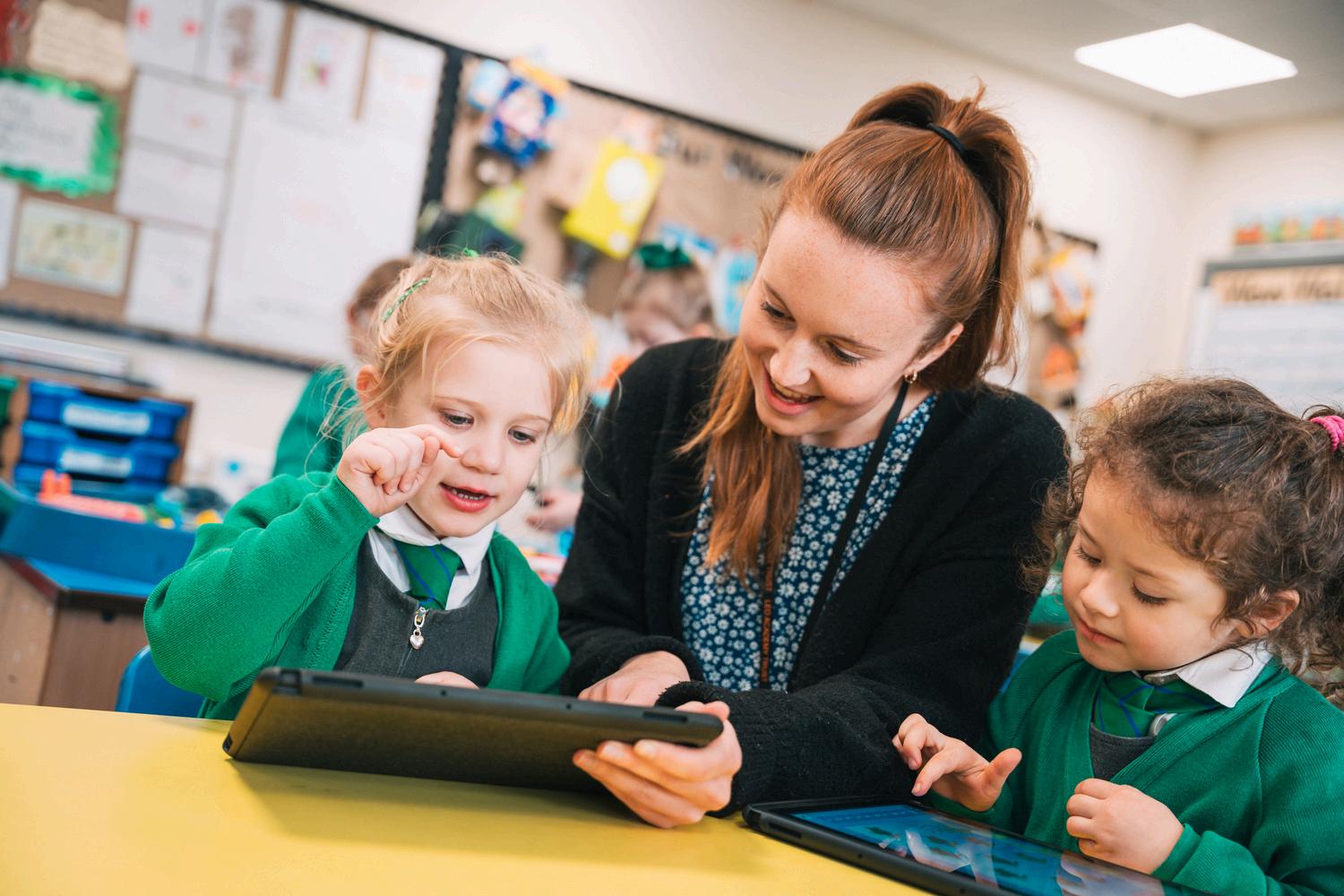
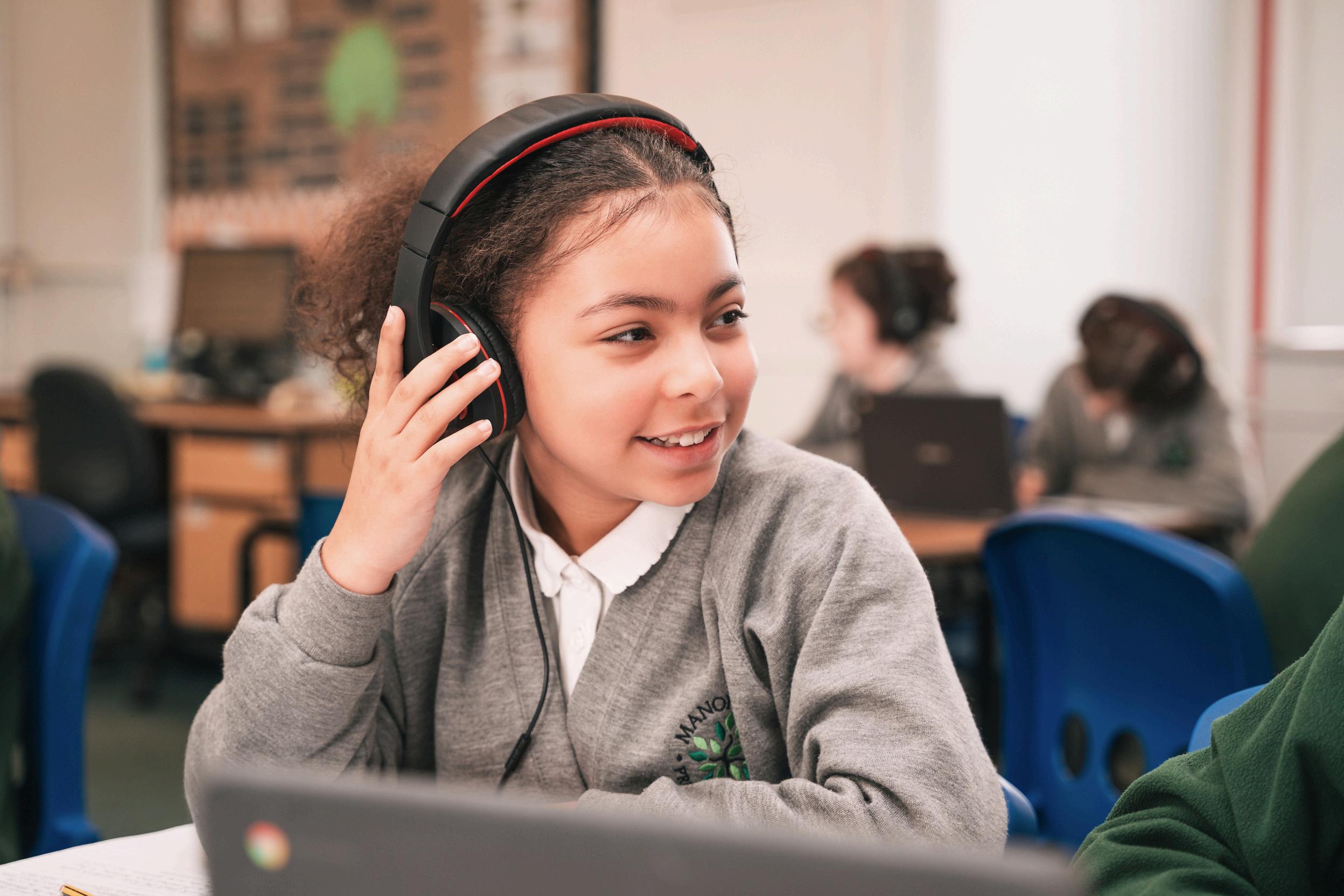

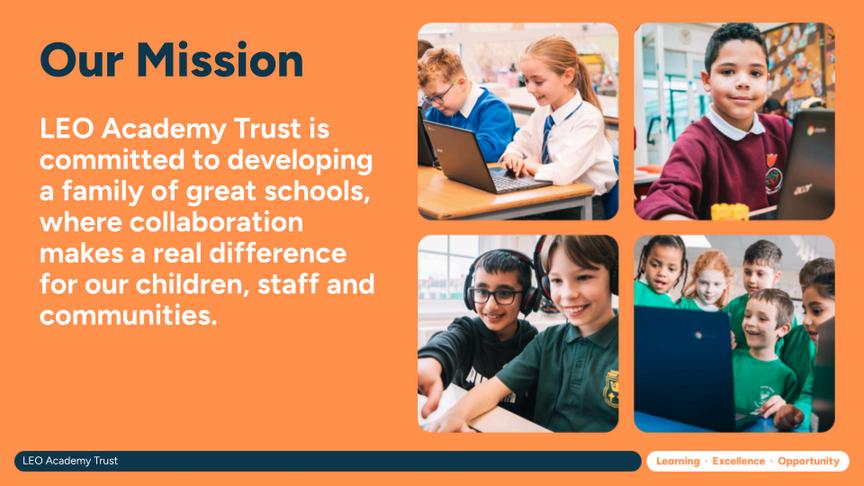
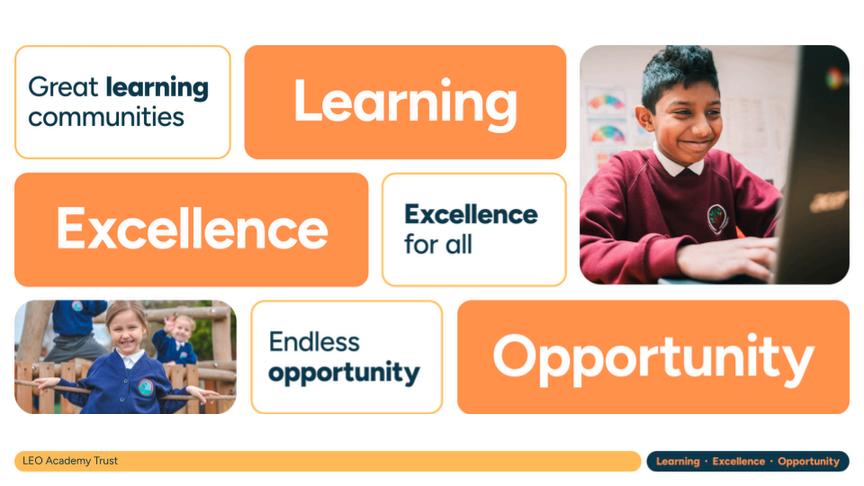


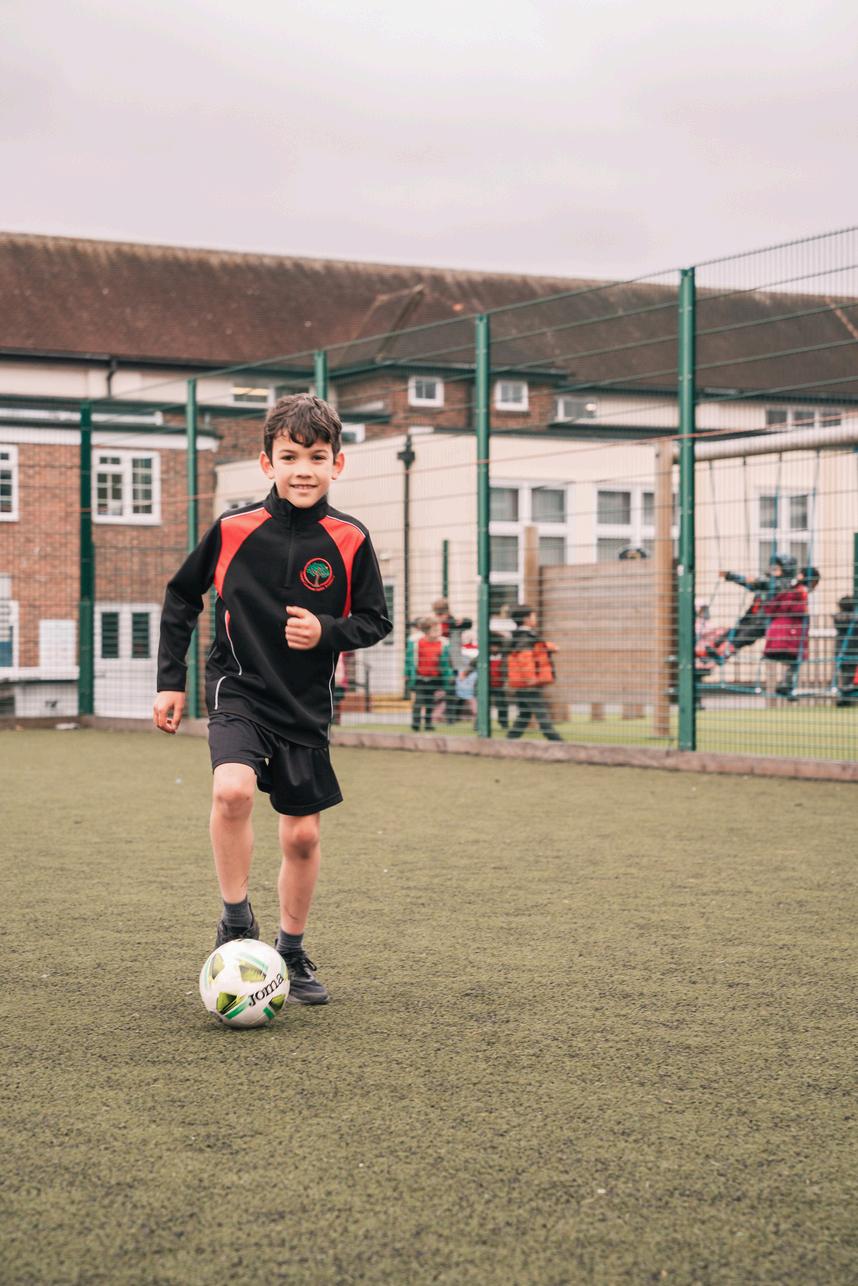









Our aim, that all children should have access to an ambitious curriculum which develops them for the challenges of life, is underpinned by our LEO Pupil Outcomes. These outcomes extend the curriculum offered at every LEO school and ensure we provide a rich, broad curriculum that prepares children for their future. This includes making sure all pupils have the fundamental skills to access the technology of the future



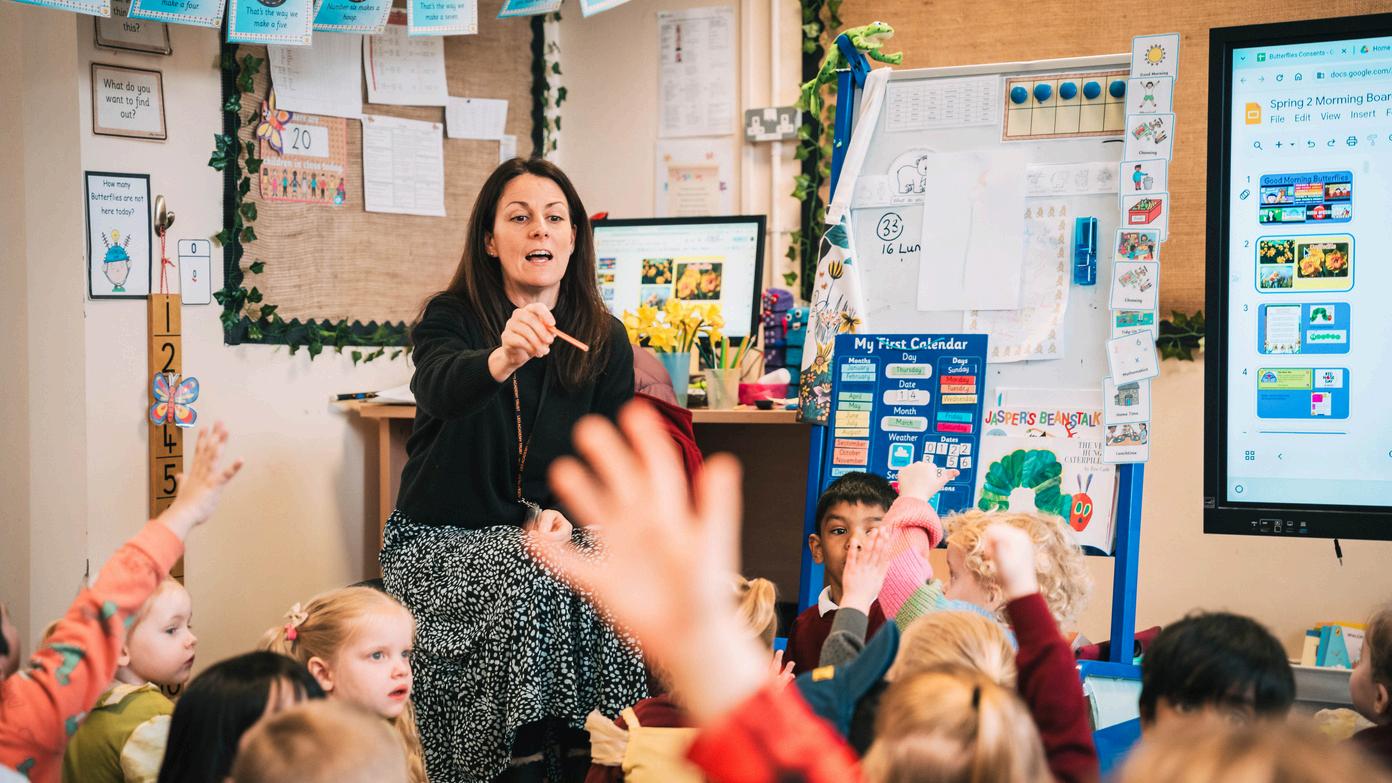
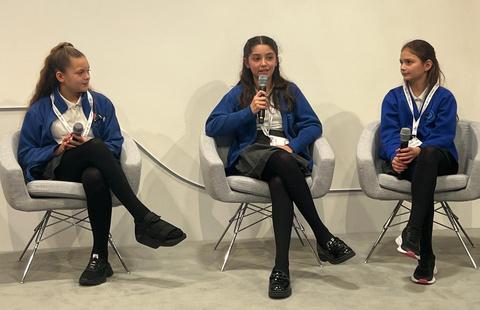


Our Learner Profile - LEO Explorers - is an approach and not a curriculum. The priority is for pupils to understand the subject disciplines, as part of a knowledge-rich curriculum, as opposed to a set of generalised skills. Therefore, these skills are used to facilitate deep substantive and disciplinary knowledge, and work alongside a progressive and inclusive curriculum. Our learner profile entails the kinds of attributes and dispositions needed for all subjects. We start from the premise that key skills are grown based on knowledge, and within curriculum subjects, ensuring our pupils are prepared for both now and the future.


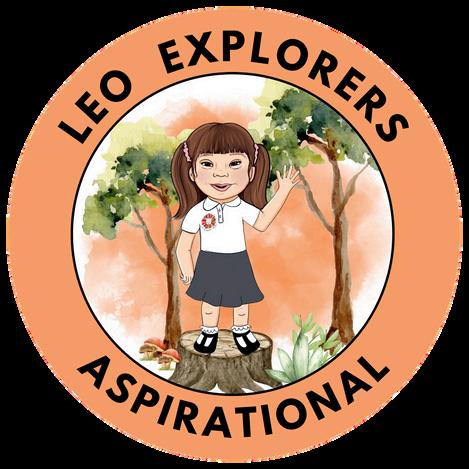


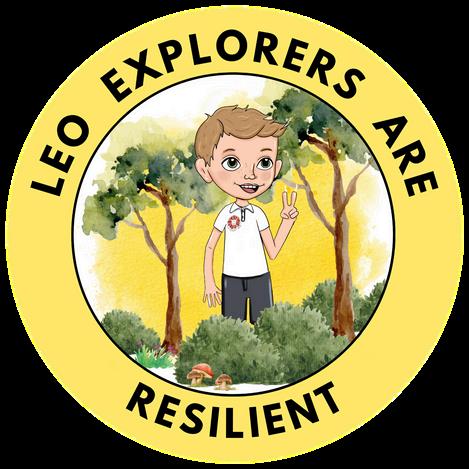

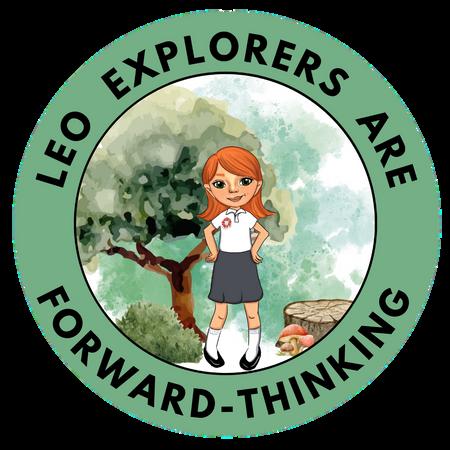


We are all one team; we share the same Vision, Mission, Values, and Aims
As one team, we have the same expectations of each other and our pupils We believe in diversity in approach, but consistency in outcomes.
We collaborate, we support each other and we achieve together
We are focused on the future and never stand still. Individually and collectively, we develop and grow. We are outward looking and always push the boundaries of what is achievable

The Trust's mission, vision and values are clearly evidentacrosstheschool.
A consistent approach to embedding and developingtheTrust’sinclusivevisionof'Excellence forAll'isclearlyevident.
The school supports the implementation of the Trust’sfivestrategicaims.
TheTrust’sTeaching&LearningStrategyis embeddedacrosstheschool.
Adaptiveteachingsupportstheschool’sinclusive approachtolearning.
Apedagogicalapproachtotheuseoftechnology iswelldevelopedacrossallyeargroups
The Trust’s People Strategy and Growing Great People Framework is embedded across the school.
The school supports the Trust’s succession planning by recruiting, retaining and developing talented staff
The school clearly follows the LEO TEAM approach. Staff develop collaborative and deep partnerships with other LEO schools as required, while the school supports and builds these beyond the Trust.
Theschooloffersanambitiouscurriculum.(AtLEO,weseeanambitious curriculumasonewhichgoesbeyondNationalCurriculumexpectations, bothintermsofcontentandoutcomes).
Leadersensurethattheschool’scurriculumiscoherentlyandprogressively sequenced.
Theschooloffersawiderangeofopportunitiesforpupils,enablingthemto excelacrossallLEOPupilOutcomes,ensuringthattheyarefutureready
SEND (including pupil wellbeing)
The Trust’s SEND Strategy is embedded across the school. The Pupil Wellbeing Policy is in place. SEND children make good individual progress from their starting points.
Pupil Premium Children
The Pupil Premium Strategy is effective and Pupil Premium (PP) children make good progress with the gap closing.
Behaviour & Attitudes
Strong values underpin good behaviour There is a whole-school behaviour approach which is underpinned by the LEO Behaviour Strategy.
Positionedinthetopten,forallattainment& progressmeasures,withintheirEEF'family'of schools.
https://educationendowmentfoundation.org.uk/ tools/families-of-schools-database/
Progressandattainmentoutcomesforpupils exceednationalaveragesbytheendofeach keystage
Theschoolsuccessfullyengageswithquality assurancereviews(internalandexternal)with positiveoutcomes
School of choice for local parents. Children attend school regularly.
Persistent Absence (PA) is effectively addressed for all groups.
Graded Good or better by Ofsted.
EffectivenessoftheAcademyCommitteetosupport&challenge theschool,inlinewiththeTrust’sSchemeofDelegation. Schoolmeetsstatutorycompliancerequirementsfor:website, GDPR,Health&SafetyandRisk.
Safeguardingiseffective.AllstaffarecompliantwiththeTrust’s SafeguardingPolicy.360’OnlineSafetyreviewisregularly reviewedandimprovedon.
At LEO Academy Trust we lead a thriving group of schools and communities, and we play a system leadership role, contributing to the wider education ecosystem.
We believe that all children and adults that work within, across, and in partnership with us, are learners, and that we all play a role in supporting each other’s learning - whether through classroom practice, employment and professional development, outreach and training, or system leadership.
Supporting learning effectively - at scale - requires structural, strategic, organisational, educational and business strategies to be aligned and underpinned by common beliefs.
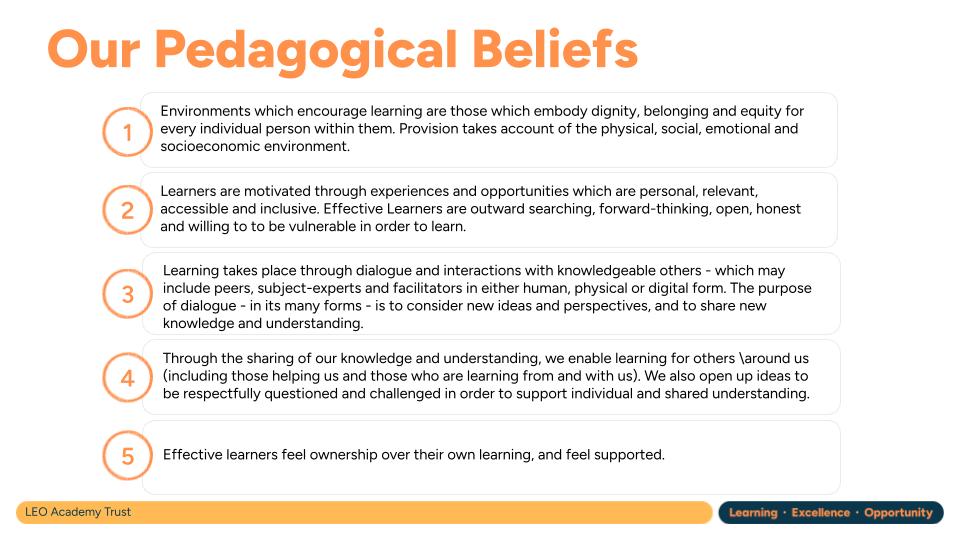
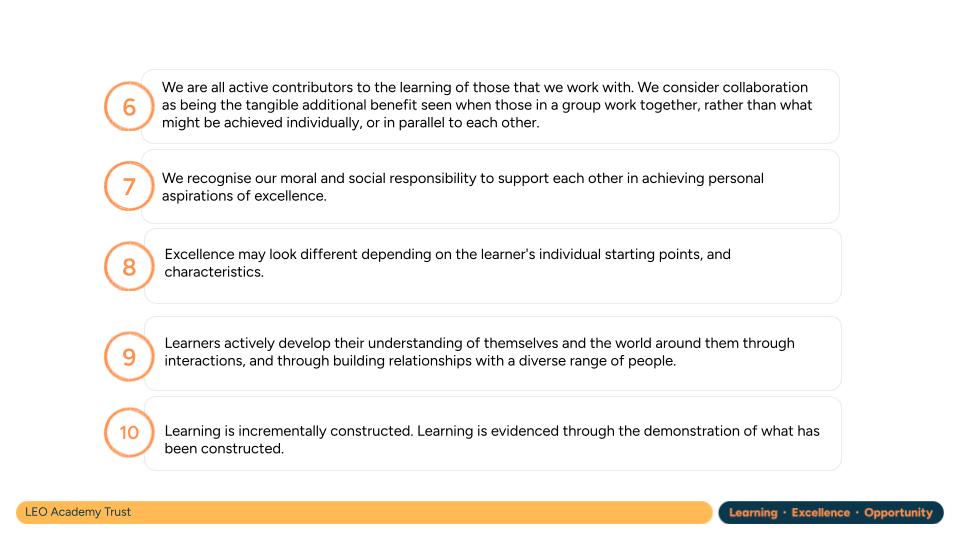


These beliefs exist to guide our strategic and system leadership, our educational and business intentions, and the strategies that we put in place to embed the spirit of LEO across all of our work.

A) Through our new designation as an Associate College of the National Institute of Teaching, develop a comprehensive professional learning programme for schools in Merton, Kingston, Richmond, Sutton, Epsom & Ewell, Elmbridge & Runnymede, Mole Valley and Reigate & Banstead. Programmes will cover ITT, ECF and NPQs.
B) Embed staff use of AI across all educational and professional services to drive efficiency and reduce workload.
C) Develop our provision for 2-4 year olds, through our LEO Nurseries, with the launch of LEO Nursery @ Shawley, LEO Nursery @ West Ashtead and LEO Nursery @ Oru Sutton.
A) Embed staff use of oracy (speaking and listening) as a vehicle to enhance teaching and learning across the curriculum.
B) Further refine and develop disciplinary literacy (reading, writing and speaking across the curriculum) in order to promote excellence in all subject disciplines.
C) Enrich the curriculum through opportunities for drama and performing arts.

Our Education Strategy, and in particular the school improvement approach, is built on professional dialogue, deep partnership and genuine ambition for all children. We know our schools well, with professional conversations detailing and sharing evidence. We utilise pupil, staff and parent voice, data analysis and first hand feedback including school visits, all triangulated with effective quality assurance. Through this relationship and approach, priorities for continued improvement are collectively identified and owned. A one team approach ensures expertise and learning is shared at all levels. Through our Education Strategy, there is a strength of pedagogy, shared vision and collective ownership. There is ambition for excellence through our LEO Pupil Outcomes and LEO Explorer Learner Profile.

OurSchoolImprovementStrategyisencapsulatedinourfiveaims:
Todevelopafamilyofgreatschoolswhere: Childrenaresafeandenjoylearning.1. Everyonefeelsincluded,respected,andvalued 2 Anambitiouscurriculumdevelopspupilsforthechallengesoflife.3. Staffpotentialisrecognisedandinvestedin.4. Wemakeadifferencetothecommunitiesweserve.5.
Our School Improvement Strategy defines who we are as a Trust and its impact measures our effectiveness. All staff work in collaboration to deliver our Aims and are committedtotheprinciplesofourLEOTEAMApproach:
Together
Wearealloneteam;wesharethesameVision,Mission,Values&Aims.
Expectation
Asoneteam,wehavethesameexpectationsofeachother&ourpupils.Webelievein diversityinapproach,butconsistencyinoutcomes.
Achieve Wecollaborate,wesupporteachotherandweachievetogether.
MoveForwards
Wearefocusedonthefuture;individuallyandcollectively,wedevelopandgrow.
SirDavidCarter(2020)illustratesthekeyattributesofsuccessfulschoolimprovement: ‘The trust’s school improvement model is responsive to the needs of each individual school’
‘Improvementshouldberootedintheevidencefromtheclassroomsofeachschool.’
‘The same resource needed to support one school may not be the best to deploy with another.’
Carter,D.(2020)LeadingAcademyTrusts:WhySomeFail,ButMostDon’t.
Our School Improvement Strategy aims to create and sustain schools where all pupils can excel across all five of our LEO Pupil Outcomes:
Active Citizens in a Global Community
LEO pupils are local, national & global citizens; they have a strong sense of identity, respect and value the importance of diversity & inclusion and make positive contributions to their community.
Self-Directed, Collaborative & Confident Learners
LEO pupils develop independence, confidence and character through sport, creativity, performance, volunteering & experiencing the world of work
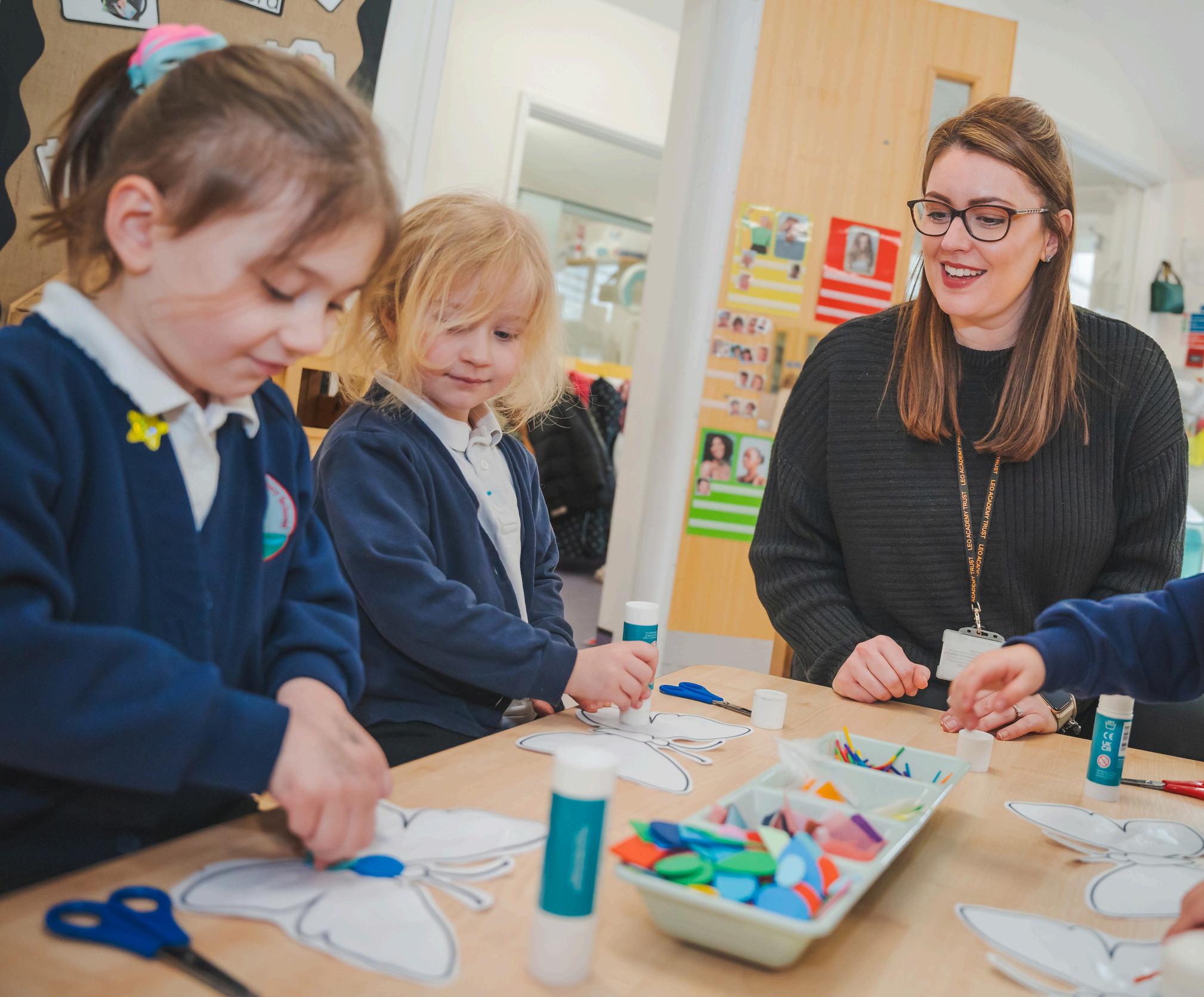
Innovative Learners who pursue Excellence
LEO pupils innovate, develop digital skills & maximise the use of technology; their performance in mathematics, English, science & computing exceeds their peers nationally.
Healthy Learners who make small changes with a big impact
LEO pupils have the physical, emotional & social literacy to overcome challenges They communicate effectively.
Leaders of today; life long learners
LEO pupils develop critical thinking, leadership skills, life skills, cultural capital & financial literacy.
School Improvement follows a system leadership model and is led by our Executive Directors At any given point, there is a collective understanding that some schools receive a higher level of support from the Trust’s central School Improvement Team, due to current need. We make leadership happen through collective shared beliefs about what will produce direction, alignment, and commitment.
Agreement on what the collective is trying to achieve together (Direction).
Effective coordination and integration of the different aspects of the work so that it fits together in service of the shared direction (Alignment).
People who are making the success of the collective (not just their individual success) a personal priority. They create a culture of continuous improvement in our schools through self-evaluation, challenge, support, and appropriate action. (Commitment)
Resources are shared across all schools in an equitable way. Where possible, we also look to share our school improvement expertise and resources beyond the Trust.
Our School Improvement Strategy provides a ‘Team Around the School’. This network of support allows the Principal to focus on quality of education and draws upon expertise in key areas such as Teaching & Learning, Inclusion, Assessment, Curriculum, Digital Skills, Stakeholder Voice, and Safeguarding.
LeadershipDevelopmentand Coaching
SchoolImprovementPartner
GrowingGreatPeople Communications
Finance People
Estates&Services
Governance& Compliance
Headteacher
QualityofEducation ProfessionalLearning Curriculum Assessment
Inclusion&Wellbeing Safeguarding Nurseries(Private) SEND BehaviourHub EYFS
TeachingandLearning
English
Maths
Computing&DigitalSkills
Music
PE&Sports
Executive Directors provide strategic leadership for a wide range of school improvement areas including:
Safeguarding Teaching and Learning
Curriculum and Assessment
SEND, Inclusion, Personal Development & Wellbeing Behaviour
Digital People, Leadership Development & Professional Learning
They are supported by central members of the LEO Leadership Team. This includes Trust Principals, Trust Vice Principals & Directors for areas such as SEND, English, Maths and Computing & Digital Skills.
Principals and Vice Principals enhance and develop the Quality of Education and Leadership and Management by providing educational leadership to:
Identify and analyse complex or persistent problems and barriers which limit school effectiveness or efficiency; Ensure the leaders focus on improving teachers’ subject knowledge and pedagogy, drawing on evidence-informed strategies; Lead well targeted plans for improvement; Evaluate progress of improvement plans; Identify impact and reshape where necessary; Coach senior and middle leaders within the Growing Great People Framework.

Areas of responsibility and accountability delegated to school-based senior leaders include:
Safeguarding
Curriculum & Assessment
Teaching & Learning (including Feedback & Response)
EYFS, KS1 & KS2 end of year pupil outcomes
Wider pupil outcomes (focused on our 5 LEO Pupil Outcomes)
Staff training, professional learning, coaching & mentoring
Reporting to the local Academy Committee
Inclusion (SEND, Pupil Premium, EAL, behaviour, mental health & wellbeing)
Pastoral care and opportunities for pupils (focused on our 5 LEO Pupil Outcomes)
Year group / phase leadership
Subject leadership
Pupil Voice & Parent Partnership
Educational visits & residential trips
Executive Leaders work in collaboration with our Principals, to set leadership and staffing structures for our schools. They delegate the above areas to leaders and teachers as appropriate. Leadership and staffing structures are approved by the CEO annually and shared with local Academy Committees and the Trust Board.
Central members of the LEO Leadership Team shape strategies which cover areas such as: Teaching & Learning, Assessment, Feedback & Response, Digital Skills, Inclusion, Behaviour and our LEO Pupil Outcomes, which support the intent behind each school’s curriculum.
Working to an agreed framework, they also support school-based leaders and teachers with school improvement, with a focus on empowerment and sustainability. Directors are deployed by the Executive Team in consultation with schools. Consideration is taken of the key focus areas for support e.g. year group/s, curriculum focus or data and is mindful of:
End of EYFS, KS1 & KS2 performance and current end of key stage targets
Next expected Ofsted inspection
Other outcomes from our school & trust level dashboards
Director support also includes the provision for further staff training and development, wider opportunities for pupils and access to a wide range of inclusion services.
LEO Executive Team Meetings every week to discuss and collectively agree strategic actions on: Safeguarding Schools - Support & Challenge Updates
WMG LEO School - School KPI Dashboard & Trust Heat Map
School Improvement Deployments (Inclusion, Teaching & Learning and Curriculum) Finance
People (including: staffing & Growing Great People Framework)
Estates & Services (including: catering, premises, IT Network & sustainability) Governance & Compliance
Other items as required
LEO Senior Leadership Team Meetings every week to support the development of, and receive updates on, key strategic areas such as: Safeguarding; School Improvement; Teaching & Learning; Curriculum & Assessment; SEND, Inclusion, Personal Development & Wellbeing; Behaviour; Finance;
People & Professional Learning;
Estates & Services (including: catering, premises, IT Network, sustainability, marketing & communications, extended schools, and lettings); Governance & Compliance, including the work of our Academy Committees; KPI Dashboards for finance, risk, the quality of education and assessment, at both school and trust level; Other items as required by Principals.
A meeting overview is set at the beginning of each term. Not all executive and senior leaders will be required to attend every meeting.
Support and challenge is provided to all schools on a regular basis throughout the year. Principals receive a calendar of planned visits ahead of the start of each academic year.
Meetings with Principals (and other senior & middle leaders as required) include: Professional Growth Coaching & Leadership Development (2 hours, half termly)
Inclusion (SEND, personal development, pupil wellbeing or behaviour) (2 hours, termly)
Teaching & Learning or Curriculum (2.5 hours, termly)
HR & Finance (1 hour, monthly)
Estates & Services (1 hour, monthly)
Safeguarding (annual audit)
Health & Safety and Fire (annual audits)
GDPR & DPO (annual audit)
Attendance (1 hour, monthly)
Academy Committee Meeting Preparation with AC Chair (1 hour, termly)
Additional visits may be added for schools causing concern.
Pupil Achievement & School Improvement Meetings with the CEO and / or Executive Director (Education) and the Academy Committee Chair
Attended by the CEO and / or Executive Director (Education), a Termly Pupil Achievement & School Improvement Meeting is held with the Principal, Vice Principal & Academy Committee Chair at the start of each term, focused on:
Pupil Data
SEF
School Development Plan
Staff Performance & LEO Growing Great People Framework
CEO Visit
The CEO visits each school on a termly basis. Informal meetings are held with the principal, school leadership team and pupil voice groups. These are focused on the school’s engagement with the Trust’s mission, vision, values, aims & LEO pupil outcomes, as well the current LEO Strategic Plan.
Professional Learning
The Trust provides a wide range of opportunities for teachers and leaders to engage with professional learning. Development opportunities include:
Bespoke ECT Induction Programme in partnership with Harris Crystal Palace Teaching School Hub and the National Institute of Teaching;
LEO & Sutton Education Trust ECT Subject Specific Training programme; Power of Coaching Programme.
Outstanding Teaching Assistant Programme
BA Hons Degree in Primary School Teaching for Teaching Assistants with the University of Buckingham in partnership with Anspear
Creative Teacher Programme
Outstanding Teacher Programme
Outstanding Leadership in Education Programme
Senior Outstanding Leadership in Education Programme
LEO Future System Leaders Programme
Access to the complete suite of National Professional
Qualifications with Harris Crystal Palace Teaching School Hub and the National Institute of Teaching Network Learning Community Meetings
Google Level 1 and 2 training
Training opportunities to develop curriculum expertise
A focus on school improvement is central to the successful integration of a new school into our Trust. Our Executive Directors work with incoming schools to carry out an audit which determines where they may require support and / or challenge.
Contact our LEO Central Team with our Go to Guide:


Our School Improvement Model is led by our Executive Directors and quality assured by: internally & externally led Trust Peer Reviews, externally led Challenge Partners Quality Assurance Reviews, CEO Visits, Academy Committee meetings, LEO Education & Standards Committee meetings and Trust Board meetings.
Our Trust’s Quality Assurance and Accountability Frameworks enable us to monitor the impact of our school improvement; we know our schools quantitatively and qualitatively. Our local Academy Committees have their sole strategic focus on the quality of education provided by their school. They have a relentless focus on safeguarding, pupil outcomes, inclusion, the curriculum, pupil voice and stakeholder engagement; the Trust’s Education & Standards Committee monitors the progress and impact of our School Improvement Strategy.
The effectiveness of our School Improvement Strategy is measured against our ‘What Makes a Good LEO School?’ and recorded on a KPI Dashboard which is used by school leaders and trustees.
What Makes a Great LEO Academy?

Support is based on:
EYFS, KS1 and KS2 end of KS data
Ofsted grade / Ofsted next steps
Teaching and Learning/Curriculum
Reviews
Audit of needs
Local intelligence, school intelligence or LA intelligence
School self-evaluation
CEO visit
Internal data (school based)
Codification of school support explained
Schools will fall into the categories below.
Definitions are adapted from, ‘Carter, D (2020) Leading Academy Trusts: Why Some Fail, But Most Don’t John Catt Educational.’
Leadership is unstable Governance is ineffective
High staff turnover
Student outcomes are weak and below national floor standards.
External support has no impact
School is likely to be Ofsted inadequate.
Leadership has been refreshed and is stable Governors know what has to be done New staff well supported by MAT. Pupil outcomes are improving and are likely below national.
School is likely to be new to the trust.
Issues with leadership of the school.
Currently RI or at risk of becoming RI
Stable leadership
Governors holding leaders to account Pupil outcomes above the national average
Some staff are now supporting other schools.
Leadership is strong. Staff see career progression
Student outcomes are significantly above the national average.
School has the capacity to support others beyond the Trust.
Support
Central education team universal offer
Safeguarding Teaching and Learning Curriculum and Assessment
SEND, Inclusion, Personal Development & Wellbeing Behaviour
Digital People, Leadership Development & Professional Learning
Training and CPD in all the curriculum areas, including digital ECT programme and support Leadership coaching and support Support with safeguarding, SEND, attendance and inclusion.
Growing Great People Framework. Shared resources.
Training and CPD in all the curriculum areas, including digital Leadership coaching and support Support with safeguarding, SEND, attendance and inclusion.
Growing Great People Framework. Shared resources.
Training and CPD in all the curriculum areas, including digital Leadership coaching and support Support with safeguarding, SEND, attendance and inclusion.
Growing Great People Framework. Shared resources.
Training and CPD in all the curriculum areas, including digital Leadership coaching and support Support with safeguardin g, SEND, attendance and inclusion. Growing Great People Framework. Shared resources.
School Improvement
Universal Offer
Pupil achievement
Pupil Data
SEF
School Development Plan
Staff Performance
& LEO Growing Great People Framework
X 3 curriculum or teaching reviews a year
Peer review
CEO visit
Team around the school meetings
Challenge
Partners Review
External SEND reviews
X 3 curriculum or teaching reviews a year
Peer review
CEO visit
Team around the school meetings
Challenge
Partners Review
External SEND reviews
X 3 curriculum or teaching reviews a year
Peer review
CEO visit
Team around the school meetings
Challenge
Partners Review
External SEND review
X 3 curriculum or teaching reviews a year
Peer review
CEO visit
Team around the school meetings
Challenge
Partners Review
External SEND reviews
Targeted additional support
More frequent executive director support
Intensive curriculum director support (e g weekly sessions)
New school -
Executive Director of Growth and Development on boarding support. Support from other LEO schools.
Targeted action plan (raising attainment plan/support plan).
Leadership support plan
Support/partnership with other LEO Schools with a similar catchment
Leadership support with implementation CEO support
Evidence-base for the vision:
More frequent executive director support
Curriculum director support (weekly for RI schools)
New school -
Executive Director of Growth and Development on boarding support.
Extra data/moderation sessions.
Targeted action plan
Leadership support plan.
Support/partnership with other LEO schools with a similar catchment
Leadership support with implementation CEO support
Sir David Carter (2020) illustrates the key attributes of successful school improvement:
‘The trust’s school improvement model is responsive to the needs of each individual school ’
‘Improvement should be rooted in the evidence from the classrooms of each school ’
‘The same resource needed to support one school may not be the best to deploy with another ’
Carter, D (2020) Leading Academy Trusts: Why Some Fail, But Most Don’t
John Catt Educational
Director support with sustaining.
EDoE support with sustaining. New school -
Executive Director of Growth and Development on boarding support.
Director support with maintaining excellence.
EDoE /CEO support with maintaining excellence.
New school -
Executive Director of Growth and Development on boarding support
These categories are fluid and change depending on audits, reviews and local intelligence
After monitoring and reviews, some schools may drop into a lower category The support will then be adapted to meet the needs of the school
For example, a school is currently Ofsted Outstanding but reviews, local intelligence and data suggests that the school is no longer Outstanding This school may then receive the support that a ‘repair’ school has Schools can move categories throughout the year
How we measure impact
National test and teacher assessment data.
Monitoring of lessons / learning walks incl Book scrutiny
Surveys and audits e.g. Teacher subject knowledge surveys/audits
Data analysis and evaluations, Pupil Premium, data for the first 20% nationally, CPOMs, Arbor, Roll, club participation etc
External Validation i.e. Challenge Partner QAR, Ofsted
Internal Trust reports i.e. Trust Peer Reviews, Impact Reports, Executive Director reports
Outreach and partnerships
Video and photo capture - impact of pupil parliament; Arts mark; work in the community and on X (formerly Twitter).
How we measure the impact on pupils
Knowledge and skills gained
Work evidencing - improvement in books
High expectations for SEND attainment and progress
Reading with fluency in class
Read widely and often (and across the curriculum)
Apply mathematical knowledge and concepts (across the curriculum)
Read with comprehension (disciplinary literacy)
Ready for the next stage of their education
Once we have evaluated the impact, plan for sustainability and suggest clear next steps for embedding practice.
This should be based on the EEF Implementation Guidance.

Our Teaching & Learning Strategy is at the heart of all aspects of our Trust’s school improvement work; it supports the delivery of our mission, vision and aims. At LEO Academy Trust, we deliver an enriched curriculum, offering a wide range of opportunities for every pupil, at every school. We believe in diversity, equity and inclusion in approach, but consistency in outcomes. Each of our schools implements a curriculum which meets the needs of their local community and is aligned to the mission, vision, values and aims of the Trust. The effectiveness of our School Improvement Strategy is measured against our LEO Pupil Outcomes.
Central to our Teaching & Learning Strategy, and an integral part of the curriculum at each school, is the development of deep learning: high quality teaching that enables students to embed new learning into their long term memory.
Our pupils are:
Active Citizens in a Global Community
LEO pupils are local, national & global citizens; they have a strong sense of identity, respect and value the importance of diversity & inclusion and make positive contributions to their community.
Self-Directed, Collaborative & Confident Learners
LEO pupils develop independence, confidence and character through sport, creativity, performance, volunteering, and experiencing the world of work.
Innovative Learners who pursue Excellence
LEO pupils innovate, develop digital skills & maximise the use of technology; their performance in maths, English, science & computing exceeds their peers nationally.
Healthy Learners who make small changes with a big impact
LEO pupils have the physical, emotional & social literacy to overcome challenges. They communicate effectively.
Leaders of today; life long learners
LEO pupils develop critical thinking, leadership skills, life skills, cultural capital & financial literacy.
Curriculum planning encompasses different areas of connectivity; broad ideas, subject to subject, pedagogical and concept links ensure that knowledge (substantive) and skills (disciplinary) are learned and then embedded into long term memory and that pupils can build on these progressively to reach agreed end points. There are clear, coherent and sequenced learning objectives and outcomes in place for each year group and these are organised to enable children to build on their knowledge and skills progressively each year
Lessons enable pupils to embed learning. They include the following fundamental approaches:
Feedback with clear next steps which have been acted upon by the children and any errors or misconceptions are addressed
Retrieval practice (or generating answers to questions on previous learning).
Metacognition and self-regulation, to include explicit instruction (e.g. I do, we do, you do).
Adaptive teaching.
Group activities and paired work (oracy).
Technology is carefully used to enhance learning and opportunities across the curriculum (Pedtech)
Modelling/explaining and questioning.
Definition of Pedtech
‘PedTech is a mindset, and all about putting pedagogical intentions at the heart and start of any thinking, discussion or action about the way that digital technology is used within education. Once those ‘pedagogical intentions’ are clear, the use of digital technology can then be chosen and used with purpose and precision.’ Dr Fiona Aubrey-Smith
Most of these strategies ensure that learning is moved from the short term memory and embedded into the long term memory. The context and relevance for children in each school is considered when planning relevant learning and meaningful wider opportunities so as to maximise each child’s ‘cultural capital’.
The curriculum at each school in our Trust draws on the knowledge of successful pedagogies of the past, while maximising the opportunities of the Cloud in the 21st Century. Our staff build knowledge and practices that foster deep learning and whole system change. Staff are empowered by innovative appraisal and professional development opportunities.
Creativity; Communication; Citizenship; Critical Thinking, Character; Collaboration.
It connects pupils with the issues most concerning young people in the 21st Century. Areas such as:
Sustainability; Ethical, active citizenship; Digital skills, technology and flexibility; Entrepreneurial activities; Mental health & wellbeing.
This is achieved through our LEO Explorer Characteristics, a set of ten characteristics which underpin our curriculum, empowering all children to embrace our LEO Pupil Outcomes.
LEO Learners are…
Aspirational
Collaborative
Creative Curious
Empathetic
Forward thinking
Motivated
Open minded
Reflective
Resilient
Evidence - based research used to inform this strategy Busch, B., Watson, E. (2021). The Science of Learning: 99 Studies That Every Teacher Needs to Know. Second Edition. United Kingdom: Taylor & Francis. Jones, K. (2021). Retrieval Practice: Research and Resources for Every Classroom: John Catt Educational Limited.
Kara, B. (2020). A Little Guide for Teachers: Diversity in Schools. United Kingdom: SAGE Publications.
Lovell, O. (2020). Sweller’s Cognitive Load Theory in Action. (n.p.): John Catt Educational Limited.
Mayer, R.E., (2005). Cognitive theory of multimedia learning. The Cambridge handbook of multimedia learning, 41, pp 31-48
Sherrington, T. (2019). Rosenshine’s Principles in Action. United Kingdom: John Catt Educational, Limited.
Key links:
Ofsted (2019). Education inspection framework - Overview of research
Michael Fullan’s 6 C’s of Deep Learning
EEF blog: The Five-a-day approach
EEF Five-a-day for SEND (adaptive teaching)
Updated June 2024

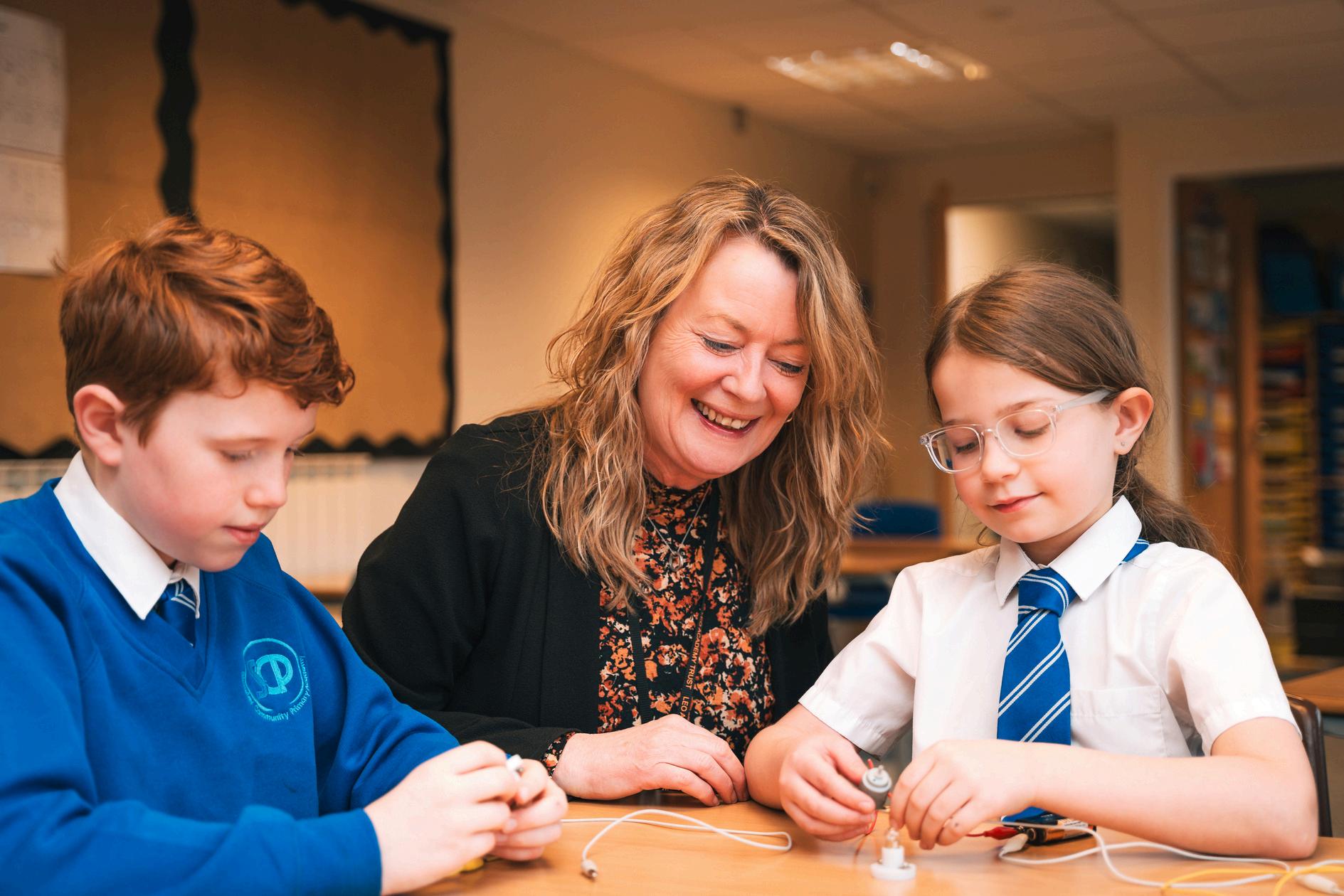


The purpose of feedback is to further children’s learning. It is an integral part of the learning process and time must be given to it. It provides key assessment information to inform planning. The impact of feedback diminishes over time –therefore feedback in the moment is more effective than comments provided at a later date. Any written marking must be meaningful, manageable and motivating. Feedback should empower pupils to correct/improve their own work. Staff should be free to select the most suitable form of feedback that takes into account: the subject content; age and experience of learners; context of the learning.
Effective feedback should:
Redirect or refocus either the teacher’s or the learner’s actions to achieve a goal
Be specific, accurate and clear
Encourage and support further effort
Be efficient and impactful - given sparingly so that it is meaningful
Put the onus on students to correct their own mistakes, rather than providing correct answers for them
Alert the teacher to misconceptions, so that the teacher can address these in subsequent lessons.
Pupils should be taught and encouraged to check their own work by understanding the success criteria, presented in an age-appropriate way, so that they complete work to the highest standard. Any pupil misconceptions should be addressed ‘in the moment’ and/or incorporated into subsequent planning and teaching
Careless mistakes should be marked differently to errors resulting from misunderstanding. The latter may be best addressed by providing hints or questions which lead pupils to underlying principles; the former by simply marking the mistake as incorrect, without giving the right answer. Most studies make a distinction between a ‘mistake’ – something a student can do, and does normally do correctly, but has not on this occasion – and an ‘ error ’ , which occurs when answering a question about something that a student has not mastered or has misunderstood.
When giving feedback, there needs to be a clear understanding between errors and mistakes. Errors are misunderstandings or misconceptions by the children that need some clarification or intervention. Mistakes are something that the child may have done only once and has the knowledge to recall to ‘fix’ this for themselves when given the time to do so.
The checking and editing process is paramount and needs to happen guided by the teacher ahead of further feedback being given
‘Accepting work that pupils have not checked sufficiently and then providing extensive feedback detracts from pupils’ responsibility for their own learning, particularly in editing and drafting skills. Pupils should be taught and encouraged to check their own work by understanding the success criteria, presented in an age appropriate way, so that they complete work to the highest standard.' This happens first before the teachers check the work and then they complete whole class feedback for what went well and next steps in learning. This will also be based on the age of the pupil.
Feedback enables pupils to know how to improve and the teacher to assess children’s work and plan future work more effectively
Feedback gives guidance, consolidation and challenge. The role of the teacher is to identify misconceptions, support, consolidate, accelerate or challenge to move all learners forward. The teachers’ main focus should be on planning and teaching inspiring lessons that build on children’s knowledge and understanding to allow them to progress in their learning.
Feedback may be immediate within the lesson, or a teacher using the information gained to adapt/plan the next lesson according to pupils’ next steps.
Effective feedback should:
Be understood by children and be suited to the work and the child.
Allow children time to respond and reflect on feedback given.
Show children what they need to do to improve.
Have a visible impact on children’s learning and progress.
Help the child to evaluate his/her own performance.
Allow the teacher to adapt/ plan future work to the needs of the children.
Type
Immediate
Responsive (catch-up)
Whole Class feedback /Summary (FeedForward)
Takes place during a lesson with individuals, groups or the whole class.
Includes formative assessment from the teacher and/or teaching assistant e.g., whiteboard / book work, verbal answers.
Often given verbally to pupils for immediate actions, and may redirect the focus of teaching or the task
Praises effort and contributions
Self marking tools allow immediate computer generated responses which provide a complete picture of the child’s needs and abilities to the teacher This may include the use of Learning by Questions, Nearpod, Google Practice Sets, Google Forms etc
All learning marked through self marking tools are reviewed by the class teacher live to move learning on/consolidate learning further/build on misconceptions etc
Takes place after the lesson or activity with individuals or groups who have been identified in the lesson as needing further support
Addresses knowledge from the lesson or activity or missing prior knowledge
Often given verbally with time to rehearse knowledge immediately
Delivered by the teacher or teaching assistant based on guidance from the teacher
Involves reading/looking at the work of all pupils at the end of a lesson or unit
Identifies and addresses key strengths and misconceptions for the class or sub-groups
Is used by the teacher to adapt future lessons considering pupils’ next steps
Allocates time for pupil reflection and editing based on feedback given or rehearsal of knowledge
May involve some peer support or support from a teaching assistant
Live sampling may be used to support this: it involves selecting a sample of work and marking it in front of pupils, e.g. use a visualiser, so students see how work is corrected, enabling them to then make amendments to their own work. Technology is used to display live sampling content using mirroring tools such as Google Chromecast.
Multimedia Presentations (i.e. Nearpod)
Screen recordings
Addressing common misconceptions in the moment (whole class)
Showcasing good examples of work and using that as a discussion point
Sharing children’s work with those in the class - peer assessment
Using reports feature to identify and target children who have found the task difficult and inform guided groups etc.
Digital Quizzing can allow teachers to see whole class data in real time, so time can be used to focus on specific questions rather than going through all answers.
Visual Cues: By recording their screen, teachers can walk pupils through specific areas of their work, highlighting strengths and weaknesses visually alongside their voice commentary
This clarifies more complex concepts and pinpoints areas for improvement
Demonstrations and annotations directly on the student's work being shown in ‘real time’ This provides a dynamic and focused explanation compared to traditional written feedback
Personalised Touch: The recording format adds a more human element, fostering a more engaging and interactive feedback exchange compared to written feedback
Flexibility and Accessibility: Recordings can be reviewed by pupils at their own pace and revisited later for reference This caters to diverse learning styles and allows for deeper understanding
Live screencasting allows for a more interactive feedback session Students can ask clarifying questions and receive immediate responses while the teacher demonstrates concepts on-screen This fosters a more collaborative learning environment
Screencasting
Voice recordings (i.e. Mote)
Google Classroom
Teachers can adapt their explanations based on childrens’ reactions during the live session This ensures the feedback addresses any lingering confusion and personalises the learning experience further
The human voice can convey warmth, empathy, and encouragement in a way that text feedback sometimes cannot This can be particularly valuable when offering constructive criticism or praising effort.
Comment banks / Private comments on children’s work
Instant feedback - ‘Dropping in’ to children’s work in the moment and then giving verbal feedback in the classroom/collaborating on a document.
The feedback methods will vary depending on the learning objective, pupil needs, and the specific task at hand. Teachers within our Trust are empowered to make informed decisions about the best type of feedback, digital or non-digital, to ensure optimal learning outcomes for all pupils.
This policy will run in conjunction with the school’s marking and assessment policy
Key Links:
EEF - A Marked Improvement
Education Inspection Framework
Ofsted and Workload
Eliminating Unnecessary Workload Around Marking
NCETM - Primary Marking Guidance

At LEO Academy Trust, we aim to foster a lifelong love of learning, through an evidenceinformed curriculum which is ambitious for all, (particularly the most disadvantaged and those with special educational needs and/or disabilities (SEND) or high needs), balanced, well-sequenced and diverse. This enables pupils to develop 'cultural capital.' The curriculum at each school is well-structured, with digital skills and technology used to transform teaching and learning
Each school covers the national curriculum and the EYFS framework as a starting point and is enhanced by our vision of Learning, Excellence and Opportunity. LEO prides itself in offering an extensive range of extra-curricular and enrichment activities for learners within and beyond LEO Academy Trust. The academic achievement, wellbeing and character development of our learners is at the heart of our ‘curriculum offer’ and we regularly review our provision to ensure that it is relevant, engaging and challenging for all.
We pride ourselves in developing the whole child and preparing them for the next stage of their learning, including the use of digital technologies, sustainability and twenty-first century skills. We want every pupil to achieve well, learn together, celebrate diversity and be globally aware.
Curriculum and pedagogy
Curriculum planning enables learners to make connections and interconnections in order to ensure that knowledge (substantive) and skills (disciplinary) are learned progressively to reach agreed end points. Lessons enabling retrieval practice (reviewing previously taught objectives), formative assessment, metacognition and opportunities for teachers/support staff to address misconceptions, means that learning is moved from the short term memory and embedded into long term memory so that learners know more, remember more and do more. The context and relevance for learners in each school is considered when planning relevant learning and meaningful wider opportunities, so as to maximise each child’s ‘cultural capital’ and knowledge of British values
The curriculum at each school in our Trust draws on the knowledge of successful evidence- informed strategies and should be used in conjunction with our LEO Teaching and Learning Strategy Staff are empowered by innovative performance management and extensive professional learning opportunities for staff at all levels.
Curriculum Principles:
Each school has a curriculum that is ambitious for all (through adaptive teaching and other strategies), giving all learners the 'cultural capital' they need for the future. The curriculum is structured and sequenced from EYFS to year 6, with knowledge of KS3, so that pupils can build increasingly rich schemata as they move through the primary years. Thus preparing them for current and future learning.
At each school, the curriculum is taught using the key aspects of our LEO Teaching and Learning Strategy. For example, feedback, retrieval practice, metacognition, adaptive teaching, oracy, technology, including assistive tech and modelling/explaining and questioning.
Learners demonstrate detailed knowledge (substantive) and skills (disciplinary) across the curriculum which progresses as learners move through the curriculum. In EYFS, teacher questioning, opportunities and continuous provision are used to prepare pupils for future learning.
Learners have opportunities for explicit and implicit learning of new vocabulary across the curriculum.
Reading is at the heart of the curriculum, through reading across the curriculum, promoting a love of reading and reading aloud to pupils Pupils read widely, speak and write well across the curriculum (disciplinary literacy).
The teaching of younger readers focusses on a robust systematic synthetic phonics programme, with materials that match their phonic knowledge. This is also continued into KS2 for learners who need to rapidly catch up.
We pride ourselves in offering a wide range of extra-curricular activities and enrichment opportunities for all of our pupils. Our pupils will have many opportunities to enhance and enrich their learning throughout their time at LEO Academy Trust There are activities on offer to suit everyone which also provide openings for pupils to discover their interests and find where their talents lie. We believe that school is about so much more than learning how to read and write and we endeavour to provide our pupils with opportunities that they may not have exposure to in everyday life.
Our forward-thinking digital strategy has transformed teaching and learning for pupils across the Trust, helping to improve accessibility, encouraging pupils’ confidence and creativity when using technology and supporting staff to maximise technology in the classroom. At the heart of this strategy is the Google Chromebook 1:1 programme, which ensures each pupil in Key Stage Two is equipped with personal Chromebooks to use in lessons and at home to continue their learning.
There are numerous clubs on offer in all schools, which vary from music and sport to cooking, chess and arts clubs. We want our pupils to learn new skills, develop self-belief and selfconfidence, and have fun!
At LEO Academy's Forest School program, children gain invaluable experiences by exploring the great outdoors. They develop a deep love and appreciation for nature while taking their learning beyond traditional classroom walls. This outdoor setting fosters strong communication skills, encourages teamwork, self-esteem, problem-solving, independence, and cultivates resilience, all of which develop their character.
Our LEO pupil outcomes:
Active Citizens in a Global Community
LEO pupils are local, national & global citizens; they have a strong sense of identity, respect and value the importance of diversity & inclusion and make positive contributions to their community.
Self-Directed, Collaborative & Confident Learners
LEO pupils develop independence, confidence and character through sport, creativity, performance, volunteering & experiencing the world of work.
Innovative Learners who pursue Excellence
LEO pupils innovate, develop digital skills & maximise the use of technology; their performance in maths, English, science & computing exceeds their peers nationally.
Healthy Learners who make small changes with a big impact
LEO pupils have the physical, emotional & social literacy to overcome challenges. They communicate effectively.
Leaders of today; life long learners
LEO pupils develop critical thinking, leadership skills, life skills, cultural capital & financial literacy This is achieved through our LEO explorer characteristics, a set of ten characteristics which underpin our curriculum, empowering all children to embrace our LEO Pupil Outcomes.
LEO explorer characteristics are:


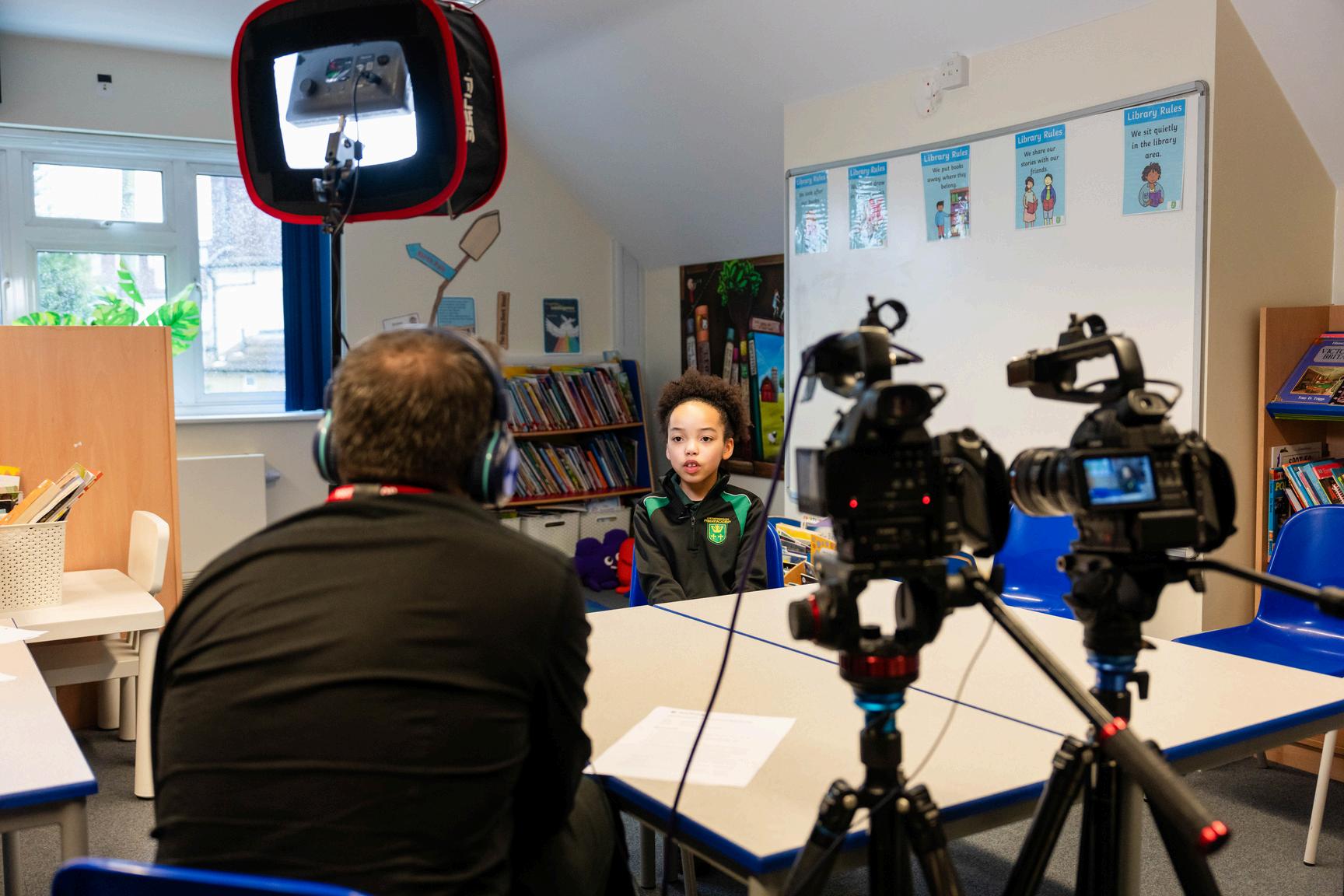
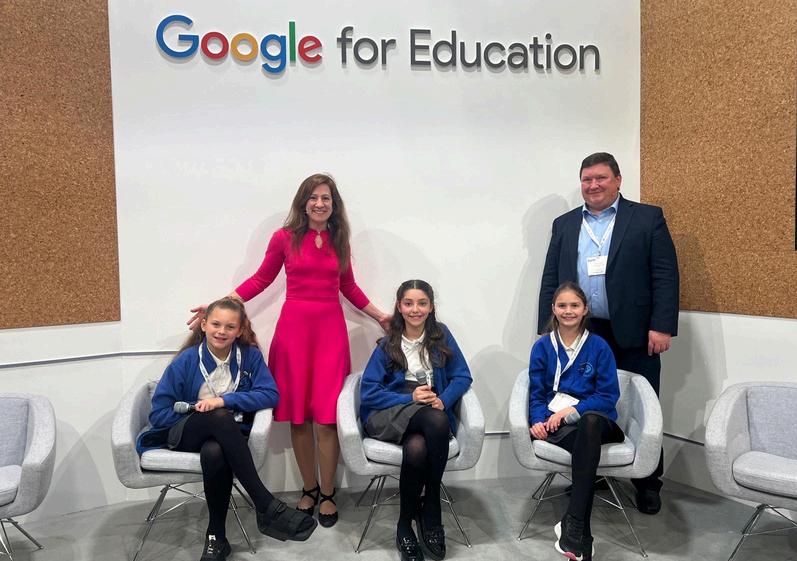
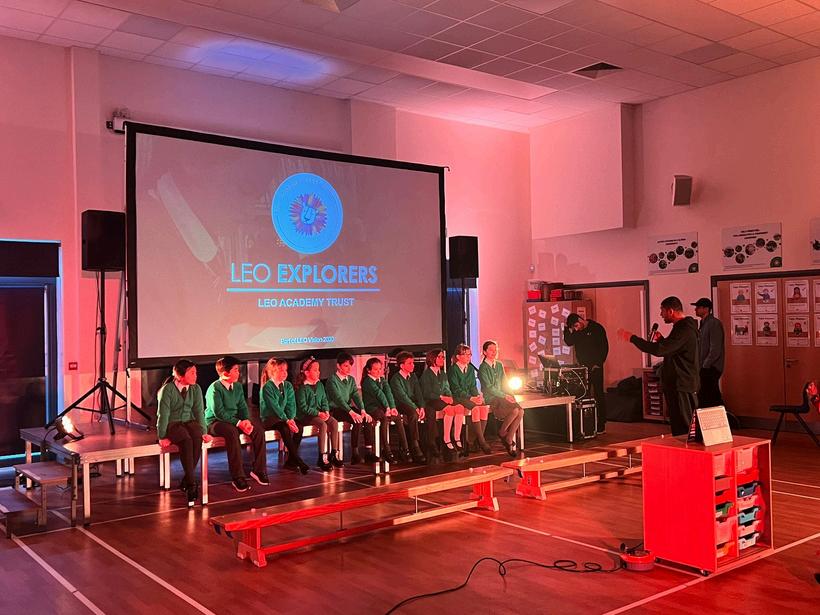
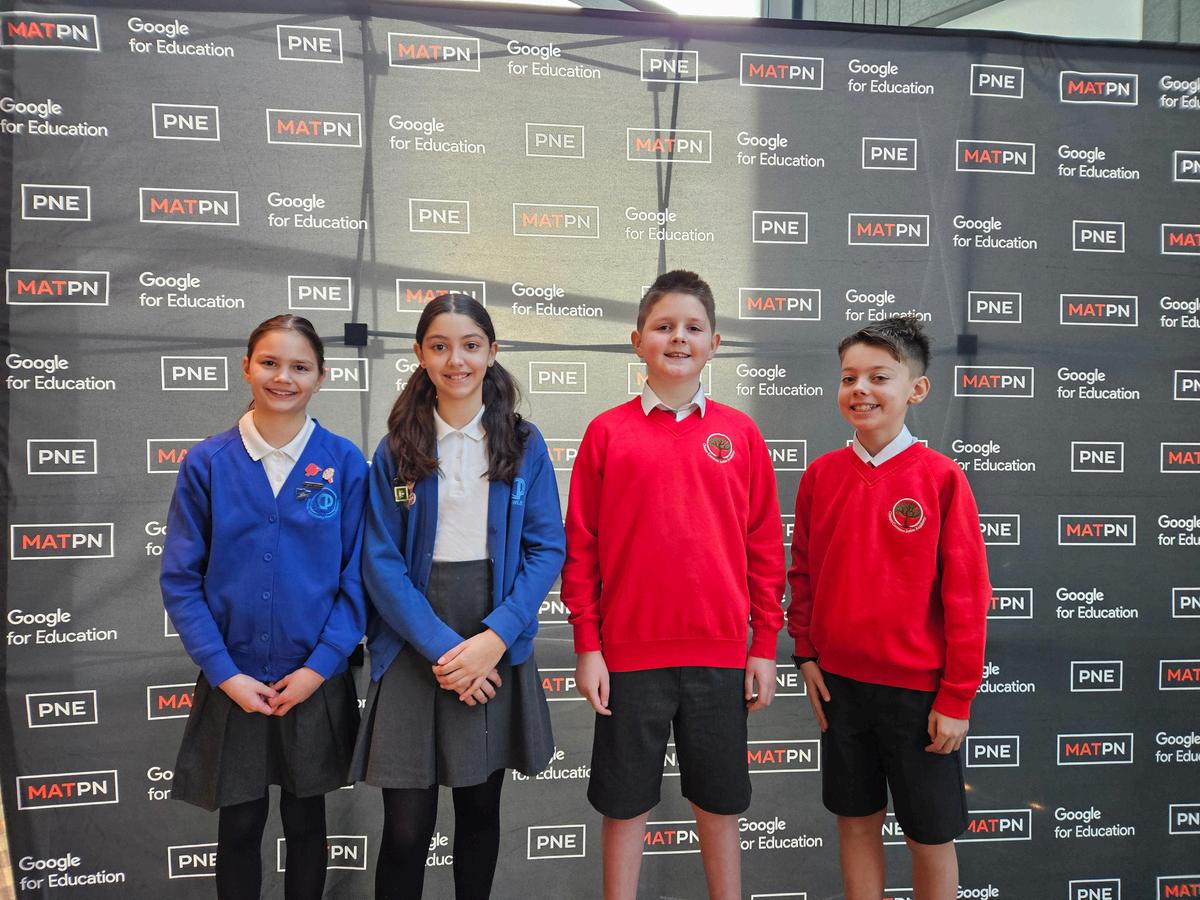

At the heart of our LEO SEND Strategy we seek to create a truly inclusive environment within our schools. It is inspired by LEO's mission of ‘Excellence for ALL’. Our approach is underpinned by our LEO Academy Trust aims: Everyone feels included, respected and valued We make a difference to the communities we serve
Our SEND strategy aligns with our EDI policy because inclusivity and equality are championed through the education we offer. LEO Academy Trust aims to embed equality of opportunity through provision of educational opportunities that reduces variability of outcomes for protected and vulnerable groups LEO Academy Trust also aims to ensure fairness and equity in relation to employment.
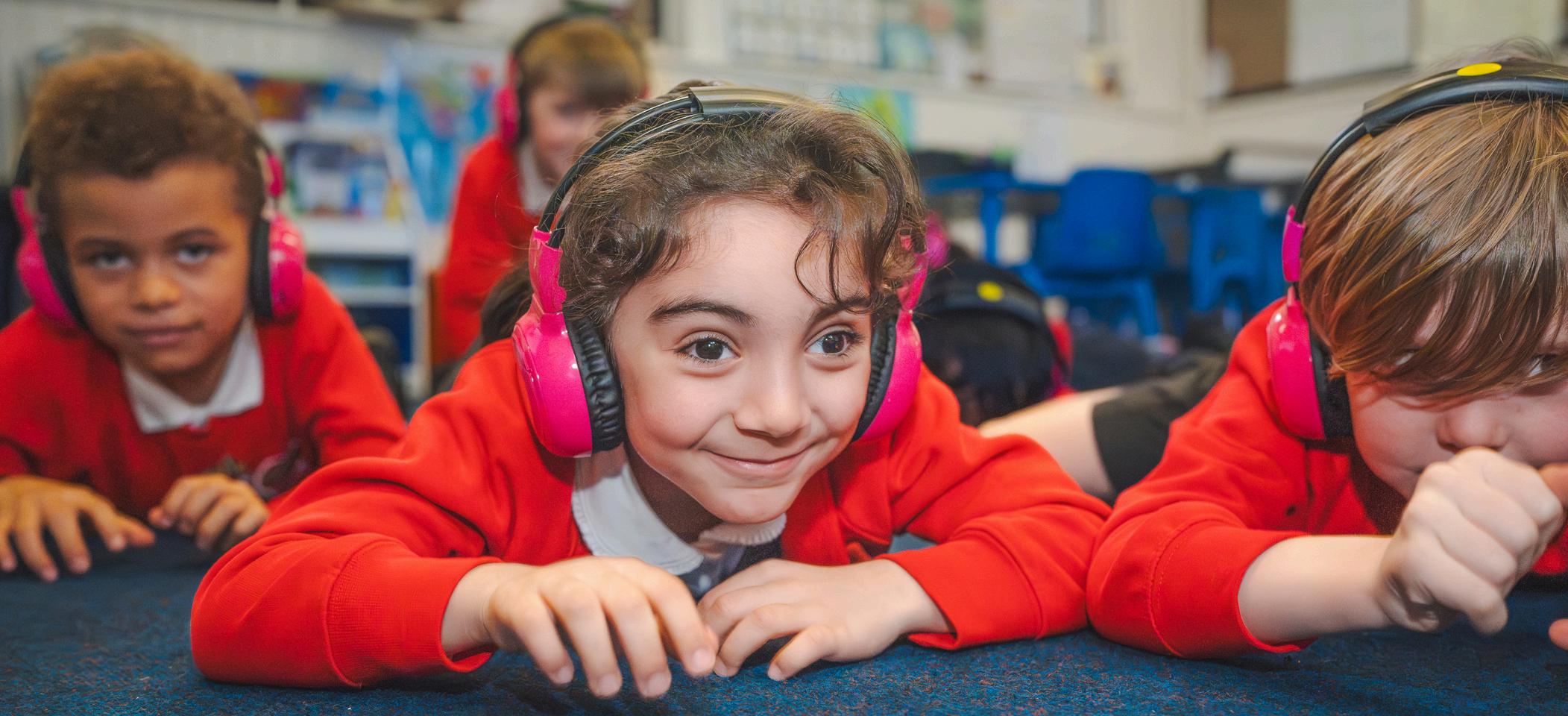
Our vision statement
LEO Academy Trust seeks to foster warm, welcoming and respectful environments, which allow us to question and challenge discrimination and inequality, resolve conflicts peacefully, and work and learn free from harassment and violence.
We recognise that there are similarities and differences between individuals and groups. However, we will strive to ensure that our differences do not become barriers to participation, access and learning. We will do this by creating inclusive processes and practices, where the varying needs of individuals and groups are identified and met. The Code of Practice (2015), paragraph 1.26 requires “progressive removal of barriers to learning and participation”. It is not possible to promote removal of barriers or achieve equality for all, by treating everyone the same. Therefore, our SEND procedures and processes provide the reasonable adjustments required to bridge any gaps between barriers to learning and participation in learning.

We will build on our similarities and seek enri understanding and learning between and to communities. We aim to enable society to be value in contributing to a rich and vibrant so

At LEO Academy Trust, we are determined to realise the full potential of every child, including those with SEND. We aim to provide them with an excellent education and the opportunities to develop as successful, confident and independent learners. We believe that parents have a wealth of information about their children and wish to work in partnership with them to ensure excellence for all.
Children with SEND will be welcomed positively to all LEO academies and classrooms with the intention of inclusivity in class teaching and learning wherever possible. This is to ensure that all children understand diversity as a positive attribute , with the ‘mindset’ of becoming adults to support, understand and integrate in the inclusive society we live in.
At LEO Academy Trust, our view is that neurodiversity such as ASD, ADHD, etc are character traits seen as assets. Therefore, the focus of teaching staff is to capitalise on adaptations to utilise the unique strengths, quirks, and interests.
Many adults with neurodiversity succeed well in the workforce, using their traits to achieve beyond others e.g. Einstein, Richard Branson, Steven Spielberg, Leonardo Da Vinci.
Our LEO SEND Strategy includes:
A whole-school positive and welcoming approach to inclusivity
All LEO Leaders are leaders of SEND.
Ensuring all pupils have access to high quality teaching. To a great extent, good teaching for pupils with SEND is good teaching for all.
Communication with parents - listening and sharing are a key partnership. Ensuring adaptations and differentiation are in place for SEND learners at the planning stage.
Use of technology integral (incorporated) into lesson design to support all children A clear SEND responsibility for class teachers including direct teaching. Complementing high quality teaching with carefully selected small-group and one-to one interventions.
Working positively with professionals and the LEO Inclusion team to find strategies to support SEND learners.
A high standard of LEO staff knowledge of SEND achieved through opportunities for training to fully understand SEND and neurodiversity.
Teaching Assistants as one resource which may be used to support SEND children's access to learning. This is always a support with an end goal of promoting independence.
Using the SEND graduated approach to support SEND learners.
Building an ongoing, holistic understanding of pupils and their needs. Schools should aim to understand individual pupil’s learning needs using the graduated approach of the ‘ assess, plan, do, review’ approach.
Analysis of behaviour to reduce patterns of behaviour.
Feedback from pupils, staff and parents to shape policy and practice.
This is strategy is based on;
SEND Code of Practice 2015
EEF SEND
NASEN
Equality Act 2010
Children and Families Act 2014


Our Professional Learning Mission
To foster a culture of continuous growth and learning, providing high quality professional learning opportunities that empower colleagues to enhance their knowledge, skills, and expertise.
Our Professional Learning Vision
Great Learning Communities Excellence for All: Endless Opportunity:
To create a collaborative and supportive environment where colleagues can share expertise, exchange ideas, and learn from one another.
To provide excellence for all by offering high quality, evidenceinformed professional learning opportunities.
Our Professional Learning Values
To deliver a wide range of continuous growth opportunities for all, supporting colleagues to embark successfully on their chosen career pathways.





Weencourage colleaguesto continuetheir learningand developmentefforts, eveninthefaceof challenges,providing highqualitysupport tohelpthemto reachtheirgoals
Wepromotea collaborativeand inclusiveenvironment wherecolleagues valueand appreciatetheideas andexperiencesof others
Weencourageour colleaguesto explorenew possibilities,think outsidethebox,and envisionnew solutions.
Wepromotea cultureofcontinuous improvement,where colleaguesare dedicatedto enhancingtheirown knowledgeandskills andthatoftheir peers
Wefosteraculture ofencouragement byprovidingarange ofopportunitiesfor colleaguestowork collaboratively,seek advice,andreceive supportivefeedback
Our professional learning principles have been developed to help to close the gap between our strategy design and delivery. The principles will provide all stakeholders with clear, robust and practical guidance as to what makes effective professional learning and how to achieve this. We understand that our principles are only as good as their consistent application and so we aim to ensure that they are effectively communicated to and understood by all members of our community.
To support colleagues to tailor development to the task and their needs and where possible their teams and setting
To motivate colleagues to invest effort in all these processes and follow through any commitments they make
knowledge Develop techniques Motivating staff Embed practice
To help colleagues to develop an understanding of the mechanics of particular strategies.
To help colleagues to develop a bank of strategies around what these mechanics look like in practice.
To provide opportunities to engage in rehearsal to help contextualise these strategies for a particular context.
To support colleagues in building fluency in these strategies and to embed them in the routines of their work. Share it
To encourage colleagues to share their learning with others both inside and outside of the trust.
* PL Principles have been adapted using the key ideas explored in: Developing Great Teaching, Peps Mcrea (2023) and the Effective Professional Development Guidance Report, EEF (2021).
LEO Professional Learning Bibliography


Through our approach to digital technology, we will personalise learning experiences and unlock a world of possibilities for every pupil Additionally, a strong digital infrastructure streamlines administration, freeing staff to focus on what matters most – our pupils. Our strategy goes beyond just deploying technology; it emphasises security, staff training, and a culture of digital literacy, including leveraging the benefits of AI. This investment in a robust app ls for
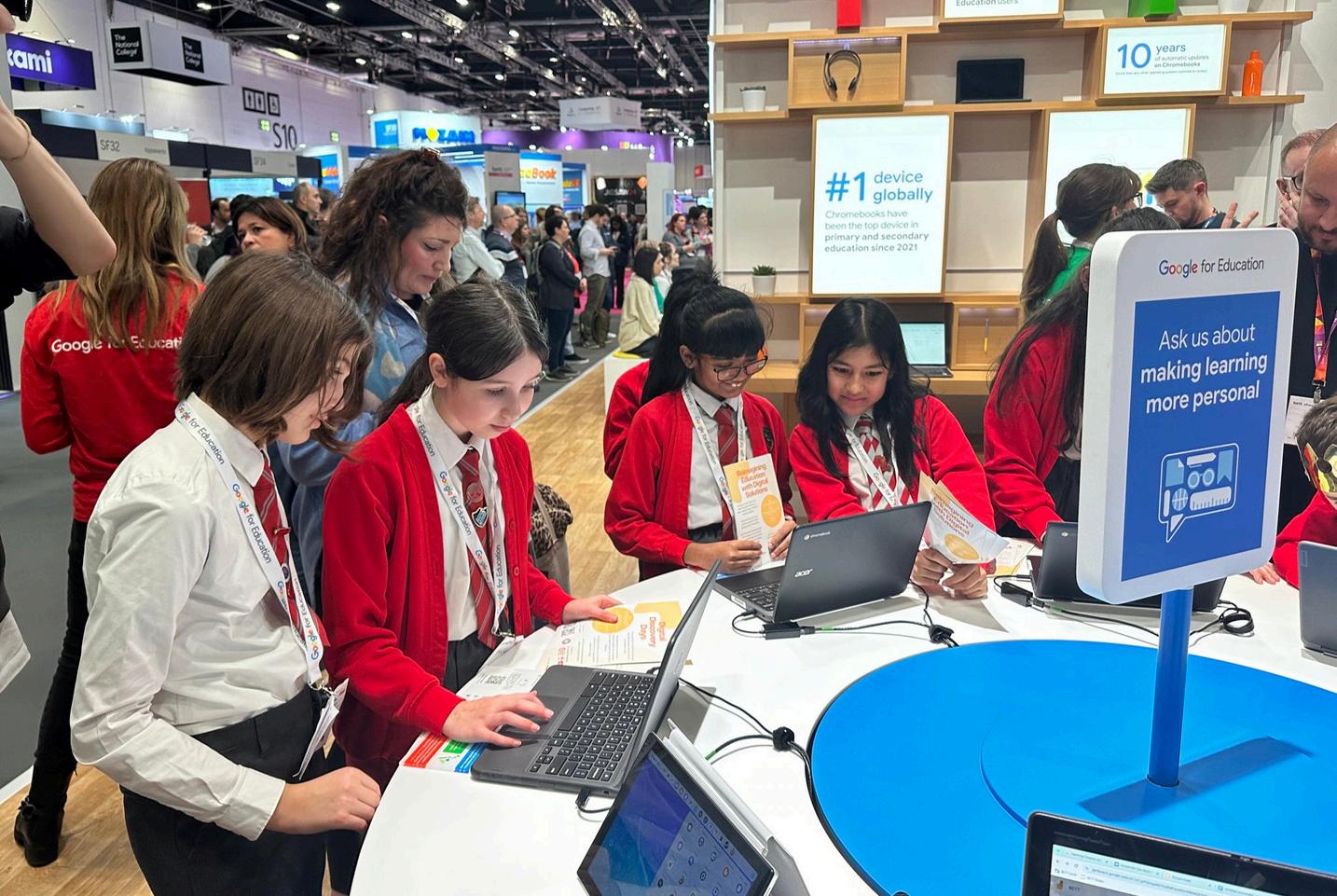
Pupilstakeownershipoftheirlearningjourneythroughpersonalisedcontent,choicein learningtoolsandacultureofself-directedexploration.Everypupilissupportedbytheir ownpersonalisedAIteachingassistant.
Digital&AIliteracyskillsenablesuccessinaconnectedworld.

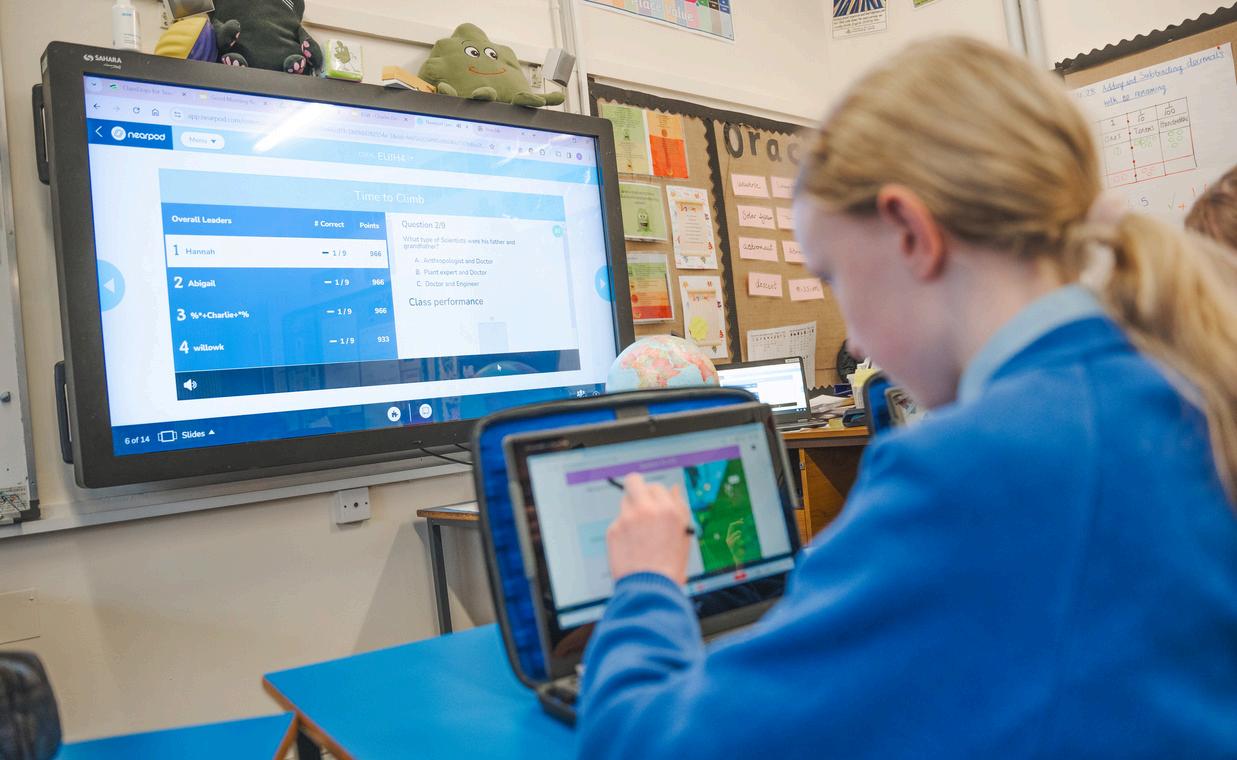
Through critical analysis, responsible content production, and navigating the evolving digital landscape, pupils are equipped to become discerning media consumers and creators.
Data and insights are harnessed to navigate uncertainty, predict trends, and make strategic decisions.
Classrooms are cultivated so that technology can be used seamlessly and reflect on best practice for a modern working world.
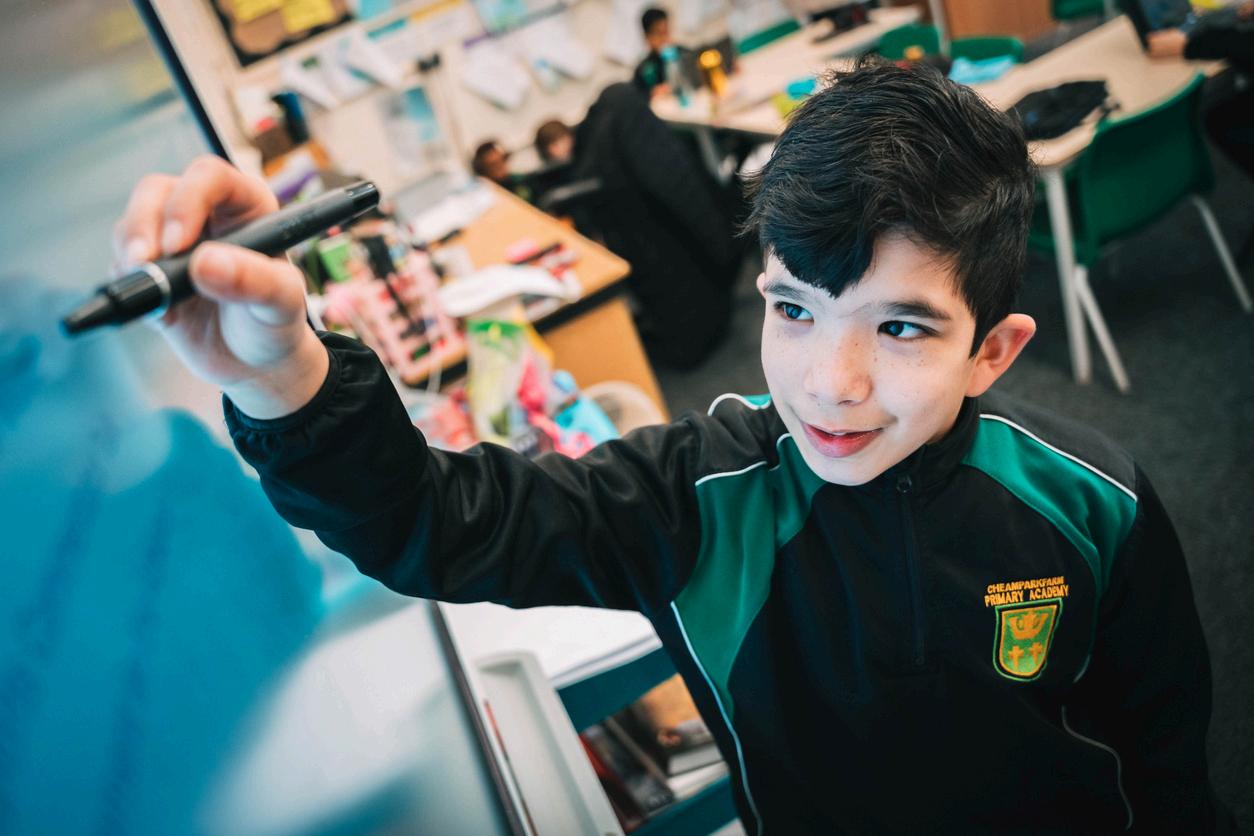
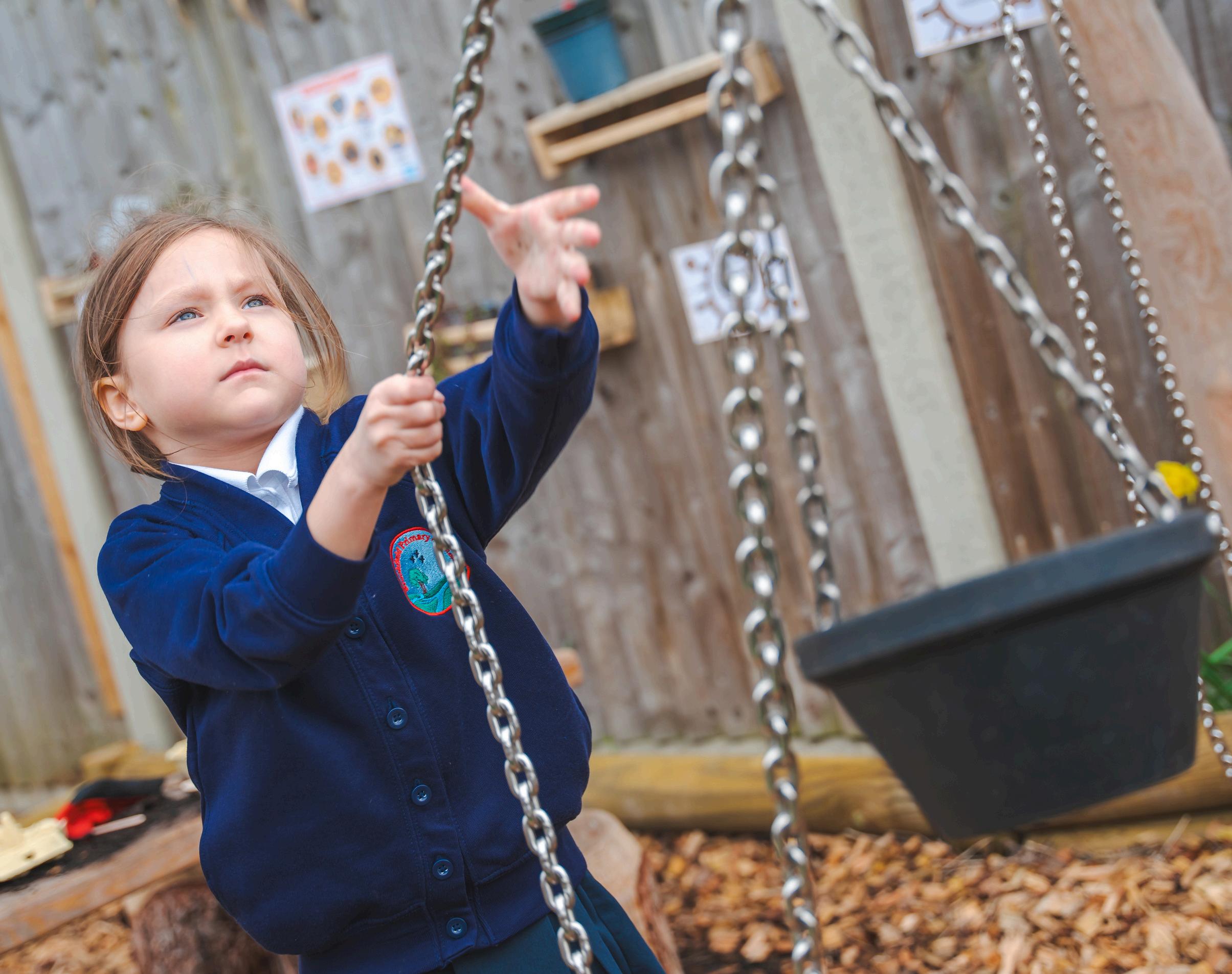


Our Trust’s financial strategy is aligned with the Trust’s overall strategic plan. This will ensure that the Trust’s financial resources are used in a way that supports the achievement of its overall goals. In order to achieve this we:
Have a sustainable business model that supports the delivery of pupil outcomes. Have good governance in place, to monitor compliance and the trust's financial health. Understand our Trust's risk appetite which supports our decision making.
Use data to make informed decisions by tracking our academies financial performance over time, benchmarking spend against other schools, and using this data to identify areas where efficiencies can be made and value for money.
Have developed a diversified income stream to support the delivery of our pupil outcomes and our wider opportunities.
Focus on efficiencies without compromising on quality.
Invest in our staff - Our staff are our most important asset, so it's important to invest in their development and well-being. This will help to improve morale and productivity, and ultimately lead to better outcomes for pupils
Be transparent and accountable by keeping the trust's stakeholders informed about its financial performance, and to be transparent about how it's using its resources.
Maintain adequate reserves, to support our financial stability and protect our ability to deliver high-quality education.

LEO Academy Trust has a robust risk management framework in place which ensures that risk is identified and reported at all levels of the organisation. This helps to protect the trust from financial losses, damage to reputation, and other risks.
Our risk management will be aimed at ensuring that the Trust achieves its objectives in the most effective way and those resources are directed at those objectives. It will not be seen as a separate exercise but as the means of best achieving the Trust’s objectives. This risk management strategy has been designed to provide a framework for managing and reporting the risks the Trust faces and ensuring its objectives are achieved in the most effective way.
It has been designed for use by all staff of the Trust and it serves to:
Communicate the strategies for managing risk within the Trust
Identify and evaluate risks which could prevent the Trust from achieving one or more of its strategic aims, objectives or delivery targets, or make their achievement substantially more difficult.
Assess the likelihood of such risks occurring (high, medium, low) and the potential impact of such occurrences with particular reference to the areas of finance, reputation and planning/operations.
Enable decisions to be taken on how much risk to accept, the actions/controls applied to avoid or mitigate the likelihood of such circumstances arising, to transfer risk or insure against the consequences and assign responsibility for implementation.
The Trust’s overall risk management plan is aimed at:
Protecting students, staff and assets.
Managing risk in accordance with best practice and reducing the cost of risk.
Anticipating and responding to changing social, environmental and legislative requirements.
Raising awareness of the need for risk management.
Integrating risk management into the culture of the Trust.
Adopting legal compliance as a minimum standard.
We also have a clear assurance map and risk registers in place to support leaders at all levels to make strategic decisions around risk management.

LEO Academy Trust is a well-established, respected Multi Academy Trust in South West London and Surrey, currently consisting of nine primary schools, with 4600 children, 650 members of staff, and a combined annual GAG / income of over £28 million.
Our Mission
LEO Academy Trust is committed to developing a family of great schools, where collaboration makes a real difference for our children, staff and communities.
Our Vision - Learning. Excellence. Opportunity. Great Learning communities; Excellence for all; endless Opportunity.
Our Offer
LEO Academy Trust makes 8 promises to its schools. These promises underpin our equitable offer for pupils, staff, parents and local communities.

LEO Academy Trust - Our Offer
Our Ambition
To develop a MAT of between 16 - 24 primary schools by 2030
The ambition of the Trust is to grow in order to further increase opportunities for our pupils and staff, to both create efficiencies and value for money central services and also further develop a highly responsive and effective school improvement model. This intention is driven by moral integrity and a mission to make a positive difference to the lives and life chances of our pupils, their families and communities.
A key aim of the Trust is to have a balance of schools at different starting points in their journey of improvement, therefore creating effective capacity for sponsorship. We will ensure that we continue to have high performing schools as part of our family and that all schools are on the journey to high performance.
In the national / local context of schools being asked to further consider partnerships, we expect to continue to grow over the next 12 months. This would potentially mean that, by the start of the academic year 2025/26, we could have up to 12 primary schools in the Trust.
We plan to explore Trust Partnerships and Full Membership with up to 15 further schools in South West London or Surrey over the next five years We will also consider trust mergers with smaller MATs or Single Academy Trusts in South West London or Surrey.
September 2024 - 9 primary schools
September 2025 - 12 primary schools
September 2026 - 15 primary schools
September 2027 - 18 primary schools
September 2028 - 21 primary schools
September 2029 - 24 primary schools

1.
To provide our USP - a highly inclusive model of education enabled through digital learning and enriched with our wider LEO curriculum offer - to more pupils & schools.
2.
To provide further opportunities for our current pupils, staff & communities. Recruiting & retaining the best staff, while remaining schools of choice for local parents
3.
To ensure33 the Trust remains financially sustainable, with sound operational foundations.
We are committed to a growth strategy that is driven by a number of factors*:
a) Sustained Performance
Sustained high performance and outcomes for existing schools
b) Optimal Number
Building a MAT of between 16 - 24 primary schools by 2030.
The number is flexible depending upon prevailing circumstances. We would also welcome the opportunity to add special school provision within our Trust
c) Location
Sustaining a manageable and coherent geographical area across SW London and Surrey, within approximately 60 minutes’ drive of our central offices in Cheam.
Key areas of focus a
Elmbridge
Epsom & Ewell
Guildford
Kingston
Merton
Mole Valley
Reigate & Banstead
Runnymede
Sutton
Tandridge

Building school improvement and operational capacity and expertise to enable all schools (current, new converter and sponsored) to make rapid and sustainable progress and move to / beyond outstanding as soon as possible.
Sponsoring less than good schools to join LEO, in proportion to our capacity to deliver improvement.
Spreading further beyond the current geographical area of our Trust, but standing ready to respond particularly to the needs of schools in our immediate locality.
Controlled growth according to a coherent plan and pace approved by the Regional Director for London and / or the Regional Director for the South East.
Using our capacity for further improvement to drive standards ever higher in all our schools. We acknowledge that our growth plans will depend significantly on a number of changeable factors such as sponsorship needs, buy-in of converters and due diligence.
The prerequisite for that they can, ove educational offer fo in our LEO schools. W join us with dif effectiveness; some additional support at be a net beneficiary good or better e experience of suppo valuable professiona for staff at other T business staff) and w regardless of curre something to offer schools. With this in m will guide our growth strategy:
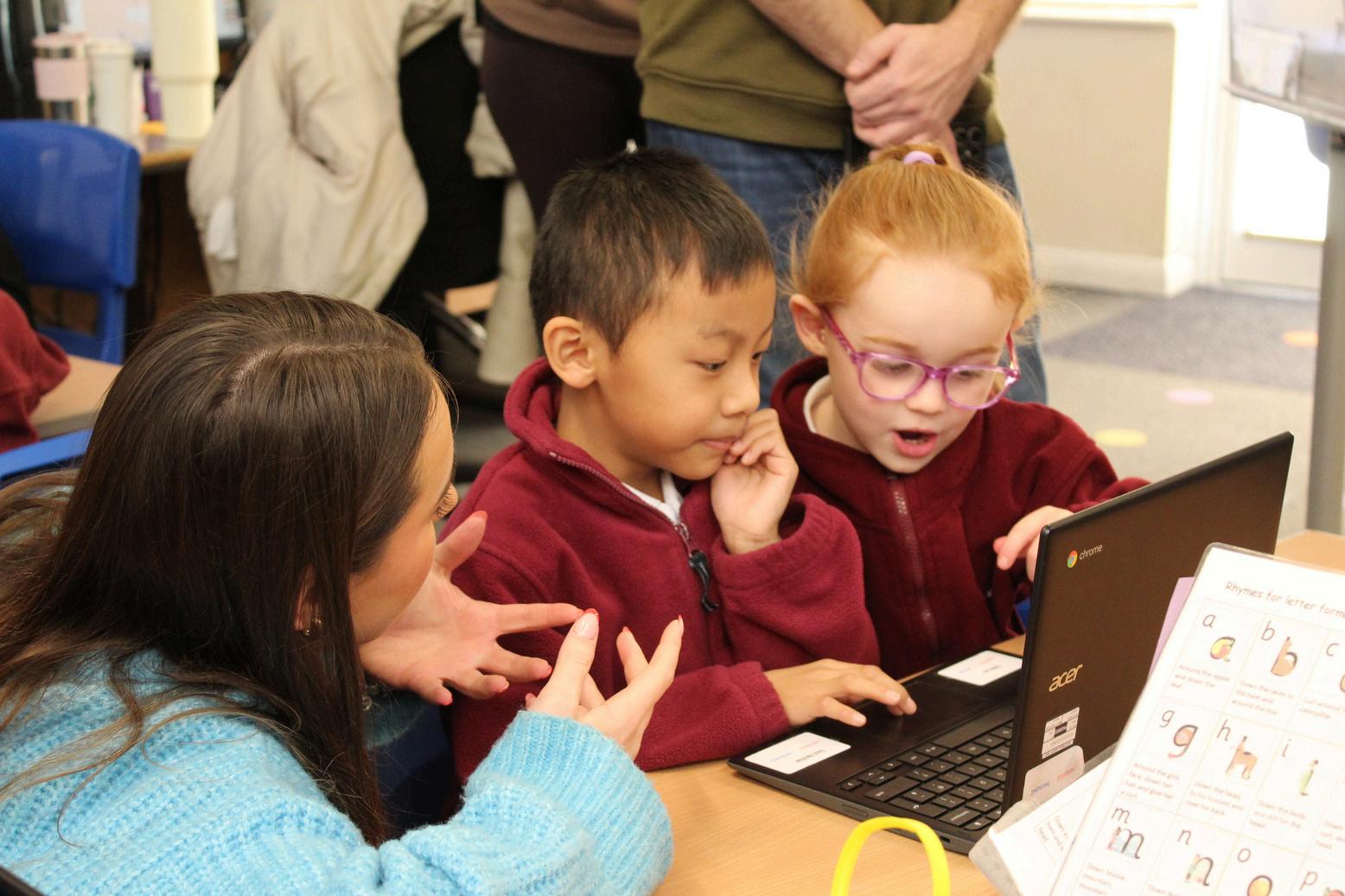
All convertor academies or existing single academy trusts (i.e. those deemed good or better by Ofsted) will be required to demonstrate what and how they will be able to contribute to the growth and development of the Trust This capacity will be identified at the initial due diligence phase.
All schools joining the Trust will be located so that they can fully integrate and be readily involved in all whole-Trust improvements and developments.
We are also open to working with schools beyond our immediate geographical area, and assess each request at both board and executive level. Within this context, we would particularly consider mergers with smaller trusts and / or free school opportunities.
All sponsored academies will be required to commit to engaging with the Trust’s support and challenge. LEO will always need to be satisfied that all new schools will fully engage and be fully committed to its vision, ethos, systems, and ways of working across the Trust.
This commitment will be tested at the initial due diligence phase.
Realistically, the Trust considers a growth in one academic year to be no more than 3 additional schools (or merger with one smaller MAT) in total, assuming that the balance of new schools brings additional capacity.
The Trust would look to explore opportunities to open a Free School (primary or special) within any area no more than one hour from our central offices.
Sponsored / requires improvement academies will be identified through local intelligence or considered on the recommendation of the Regional Director(s) and after due diligence by the Trust Executive Team, which will make its recommendation to the LEO Board of Trustees

The Trust Executive Team is required to scope all new schools potentially joining the Trust and propose these, informed by a risk based analysis, for ratification by the Board.
All schools will need to prove that they are financially viable or that the leadership/structural model adopted on entry is financially viable. If a recovery plan is in place, this must be robust and approved by both the Regional Director and the Board of Trustees prior to the school joining the Trust.
At LEO Academy Trust, we have a proven track record of significant school improvement in our primary schools. Our capacity for school improvement and Trust growth includes:
The Board of Trustees is a strong blend of experienced and new members with a broad range of professional knowledge and skills, enabling them to robustly hold the Trust leadership to account A robust governance structure and our Trust Director of Governance & Compliance provide Trust wide support and oversight, with centralised policy administration.
The Trust has six experienced executive leaders, with experience of leading good and outstanding schools, and / or supporting school improvement at scale across the system Our Executive Leaders also support school improvement across Surrey and many London Boroughs. Our CEO led the transformation of our founding sponsor school as Executive Principal and is a Senior Partner at Challenge Partners and a member of the Teaching & Learning Advisory Panel at LGfL. Our COO has led the full centralisation of the Trust’s business functions and supports the DfE as a School Resource Management Adviser.
KS2 standards at all our established schools have all been at or above the national standard for at least three years. The primary curriculum is highly ambitious, enriched and bespoke to each school.
https://www.compare-school-performance.service.gov.uk/multi-academytrust/15878/leo-academy-trust?tab=primary
Established and effective school improvement processes have led to swift, sustainable improvements in all our schools. All schools are supported by our Team Around The School Model:

Our Network Learning Communities meet each half term. They are used by leaders and teachers to share effective practice and to work together on school improvement challenges. They provide support, challenge and active research opportunities.
The growth of our central education teams, provides a ready supply of expertise to address issues and risks in a timely manner. The Trust is an associate college of the National Institute of Teaching; an exceptional professional learning offer is provided for all staff.
Strong operational and system leadership in place centrally to support: school improvement, HR, finance, operations, capital projects, central contracts, health and safety, data, marketing, communications and IT.
LEO Academy Trust offers its schools a centralised finance service, reducing the burden upon them by processing invoices and placing orders. The Chief Operations Officer (COO), who leads the central business team, works closely with the CEO and our Executive Team to shape and maintain school budgets, ensuring that they are in a balanced position, effectively delivering improvements and that they are sustainable.
The Trust recognises that all growth comes at a financial cost. LEO is prepared to invest in growth, and builds funding into its annual budget to recognise the cost of changes and support each new school may require. The Trust Board agrees this amount on an annual basis, when setting its annual budget each Summer. The Trust maintains large reserves to support growth.


Empowering People, Building Communities, Reimagining Education: A Vision for 2030
2030 promises a world brimming with both potential and challenge. As technology reshapes our lives, the need for a thriving society built on strong education, empowered communities, and empowered individuals becomes paramount
Thriving People: By leveraging local, national, and global knowledge, we will cultivate a future where our people are equipped to reach their full potential.
The Challenge: Our world is in flux. Change, uncertainty, and opportunity abound. Yet, amidst it all, one thing remains constant: the potential of our children and young people They are the architects of our future, and their needs must guide our actions
Our Mission: At LEO Academy Trust, we are committed to developing a family of great schools, where collaboration makes a real difference for our children, staff and communities.

Together
We are all one team; we share the same Vision, Mission, Values & Aims.
As one team, we have the same expectations of each other & our pupils. We believe in diversity in approach, but consistency in outcomes.
Achieve
We collaborate, we support each other and we achieve together.
Move forwards
We are focused on the future; individually and collectively, we develop and grow
The Essential Role of Our People: We recognise the immense responsibility we shoulder. It is our leaders and staff who transform ambition into reality. Their dedication, expertise, and unwavering belief in our pupils are the cornerstones of our success.
Investing in the Success of Our People: Our people are not just employees; they are partners in this shared endeavour. We are committed to supporting and investing in our people. This updated People Strategy builds on our core values and strengthens our commitment to attracting, developing, and retaining exceptional staff. We recognise the vital role our people play in shaping the future of LEO Academy Trust and empowering our pupils to thrive and achieve the best possible outcomes.

Looking ahead to 2030, this strategy outlines six key themes to cultivate a vibrant and sustainable workforce.
1. Culture: Cultivating a Thriving and Empowered Workforce
Investing in Staff Well-being: Developing practice and resources to empower staff to deliver their best.
Championing collaboration: Cultivating a compassionate and human centred workforce with the aim of attracting, developing, and retaining high performing staff
Prioritising a Supportive Working Environment: Encouraging healthy boundaries and strategies for managing personal and professional commitments.
2. Diversity and Inclusion: Building a Stronger Workforce
Championing Equity: Identifying and addressing barriers to equal opportunity in recruitment, promotion, and professional learning for every staff member.
Celebrating Diversity: Embracing cultural richness, fostering inclusivity, and valuing unique perspectives.
Investing in Accessibility: Ensuring all staff have equal access to resources, information and opportunity to promote inclusive working environments
3. Continuous Learning: Nurturing Workforce Potential
Professional Learning: Providing evidence-based professional learning, to empower colleagues to enhance their knowledge, skills and expertise aligned with career aspirations.
Personalised Growth Plans: Providing coaching opportunities, fostering a culture of continuous growth and improvement.
Make a Positive Contribution: identify and support opportunities across the education system to deliver high quality, professional learning including for teachers through the Early Career Framework and beyond.
4. Technology as an Enabler: Advancing our Workforce
Harnessing Technology for Efficiency: Streamlining processes with innovative AI powered tools, allowing greater space for human connection to drive improvement
Empowering Staff and Pupils: Fostering a culture of technological literacy, responsible digital citizenship and personalised learning.
Staying at the Forefront: Partnering with industry leaders to explore cutting-edge educational technology solutions.
Building Trust and Transparency: Establishing open communication and accountability to the communities we serve.
Strengthening Community Relationships: Collaborating with local businesses, charities, and families to enrich pupil experiences.
Empowering Staff as Community Leaders: Providing opportunities for staff to contribute to community initiatives and projects.
Fostering an environmentally conscious culture: Committing to and being ambitious with our future environmental responsibilities
Adopting Sustainable Practices: deliver an environmentally sustainable model by motivating staff to champion impactful initiatives and resourcing our estate with cutting edge technologies
Embedding Sustainability into the Curriculum: Equipping pupils with the knowledge and skills to pioneer green practices for a sustainable future
This strategy is a living document that will evolve through ongoing dialogue and collaboration. We are committed to providing a work environment where all staff feel valued, empowered, and inspired to contribute to the continued success of LEO Academy Trust. By focusing on these six core themes, we can ensure that LEO remains a vibrant learning environment into 2030 and beyond.
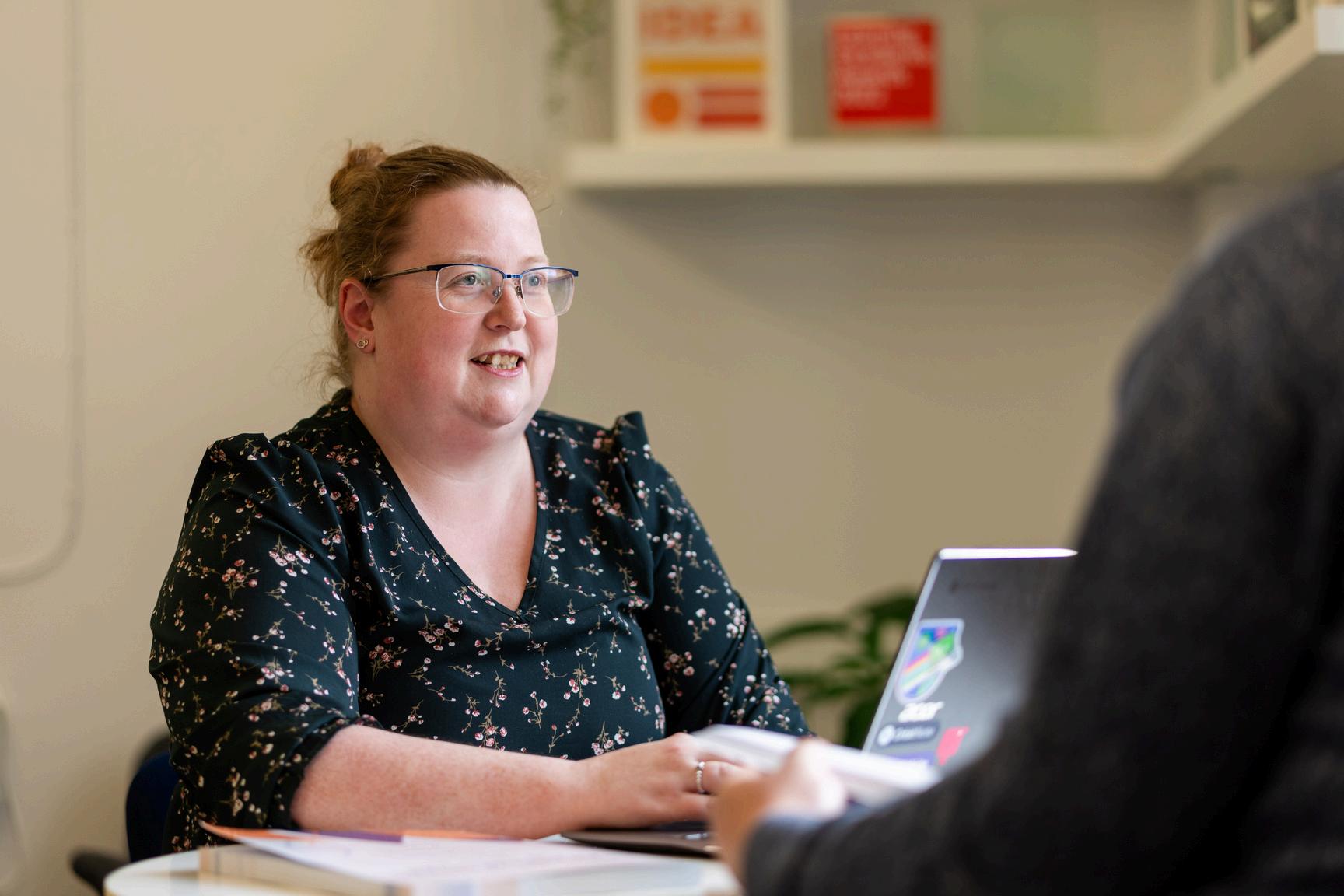


Our Trust recognises in today's rapidly changing world, it is more important than ever for schools to take a proactive approach to sustainability. By integrating sustainability principles into the curriculum, fostering a culture of environmental responsibility, and reducing our environmental impact, we can create a more sustainable future for our children and the local community.
This sustainability strategy is a reflection of our Trust values and our commitment to creating a better future for our children and our community. We aim to lead in sustainable education, and we are committed to continuing to find new and innovative ways to reduce our environmental impact and promote sustainability.

We will integrate climate change education across the curriculum, empowering students to understand the challenges and solutions related to climate change.
We will establish a sustainability committee to oversee the implementation of our sustainability initiatives and engage students, staff, and the wider community in sustainability efforts.
Awareness Campaigns:
We will organise awareness-raising events and campaigns to promote sustainable practices and educate the Trust community about the importance of sustainability.
Energy Efficiency:
We will implement energy-efficient practices and technologies to reduce our energy consumption and minimise our carbon footprint .
Sustainable Transportation:
We will promote sustainable transportation options, such as walking, cycling, and public transport, to reduce our reliance on fossil fuels and promote healthier lifestyles

We believe that this sustainability strategy will help us to create a more sustainable and environmentally friendly school community that empowers students to become informed and engaged environmental stewards. We are committed to working together to achieve our sustainability goals and create a better future for all

Objective:
To proactively build the Trust’s reputation, within our local community, regionally and in the wider sector, allowing LEO Academy Trust to bolster its credentials, attract growth and position the Trust as a leading education provider in the area.
Aims:
Our communications strategy aims to Raise the profile of LEO as a brand both locally and within the wider sector; Enhance the public's understanding of LEO ‘ s vision, mission and values; Build positive relationships with the community and local and national media; Promote LEO Academy Trust as a desirable choice for pupil and families; Recruit and retain the best people who align with LEO vision, mission and strategic aims.
Successfully delivering this strategy will enhance and protect the Trust’s reputation, thereby helping achieve the aim of raising its profile to amplify local support for all LEO schools and enable future growth.
Enhancing the Trust’s Profile:
Integrating the core communications disciplines of proactive positive PR, reputation management, public affairs and stakeholder engagement ensures a joined-up approach that demonstrates the strengths and achievements of the Trust to its target audience.
The Trust’s target audience will include, but not limited to; families and carers of current and prospective pupils, staff, governors, wider school communities, key decision makers, other schools who may benefit from joining a Trust and the wider education sector.
Positive PR is important to the Trust and so we engage with partners who have expertise in providing positive profile-raising opportunities and support with reputational issues if needed. They assist us in securing positive local and regional media coverage for our schools in order to build and maintain a strong reputation in the local community. Our partners also support us to showcase our schools’ and Trust’s ethos, approach to education, and our vision amongst our key target audience by using key messaging to join up and present the Trust as a unified family of schools.
The key messages that LEO Academy Trust will communicate through its public relations efforts include:
LEO Academy Trust is an innovative multi-academy trust that provides great learning communities, excellence for all and endless opportunities LEO;
LEO Academy Trust is committed to providing a safe and supportive learning environment;
LEO Academy Trust is a diverse and inclusive community;
LEO Academy Trust recognises and invests in staff potential;
LEO Academy Trust delivers an ambitious curriculum for all At the heart of this is our
LEO Pupil Outcomes and LEO Learners Pupil Characteristics;
LEO Academy Trust is a great choice for students and families because we make a difference to the communities we serve.
LEO Academy Trust will use a variety of communication channels to reach its target audiences, including:
The Trust and individual academy websites
Newsletters
Social media including Twitter, Instagram, and Facebook
Film and video coverage
Local, regional, trade and national media coverage
Public events
Media relations
Stakeholder and sector engagement
Frequency:
LEO Academy Trust will communicate with its target audiences on a regular basis. The frequency of communication will vary depending on the audience and the message.
The effectiveness of LEO Academy Trust's communication and public relations efforts will be evaluated on a regular basis. This will be done by tracking the following metrics:
Website traffic
Social media engagement
Media coverage
Parent and family satisfaction
Pupil achievement and outcomes
In addition to the principles outlined above, LEO Academy Trust will follow the following additional guidelines when conducting public relations activities:
Be honest and transparent in all communications.
Avoid making promises that cannot be kept.
Be responsive to inquiries from the media and the public.
Correct any inaccurate information that is published about LEO Academy Trust.
Use social media responsibly and ethically.
Protect the privacy of students and families.
By following these guidelines, LEO Academy Trust can ensure that its public relations efforts are conducted in a responsible and ethical manner.
LEO Academy Trust is committed to using communication to build relationships with its stakeholders and to promote its vision, mission, and values. By following the principles outlined in this strategy, we can ensure that we proactively build the Trust’s reputation within our local community, bolster our credentials, attract growth, and position ourselves as an effective and successful Multi Academy Trust.
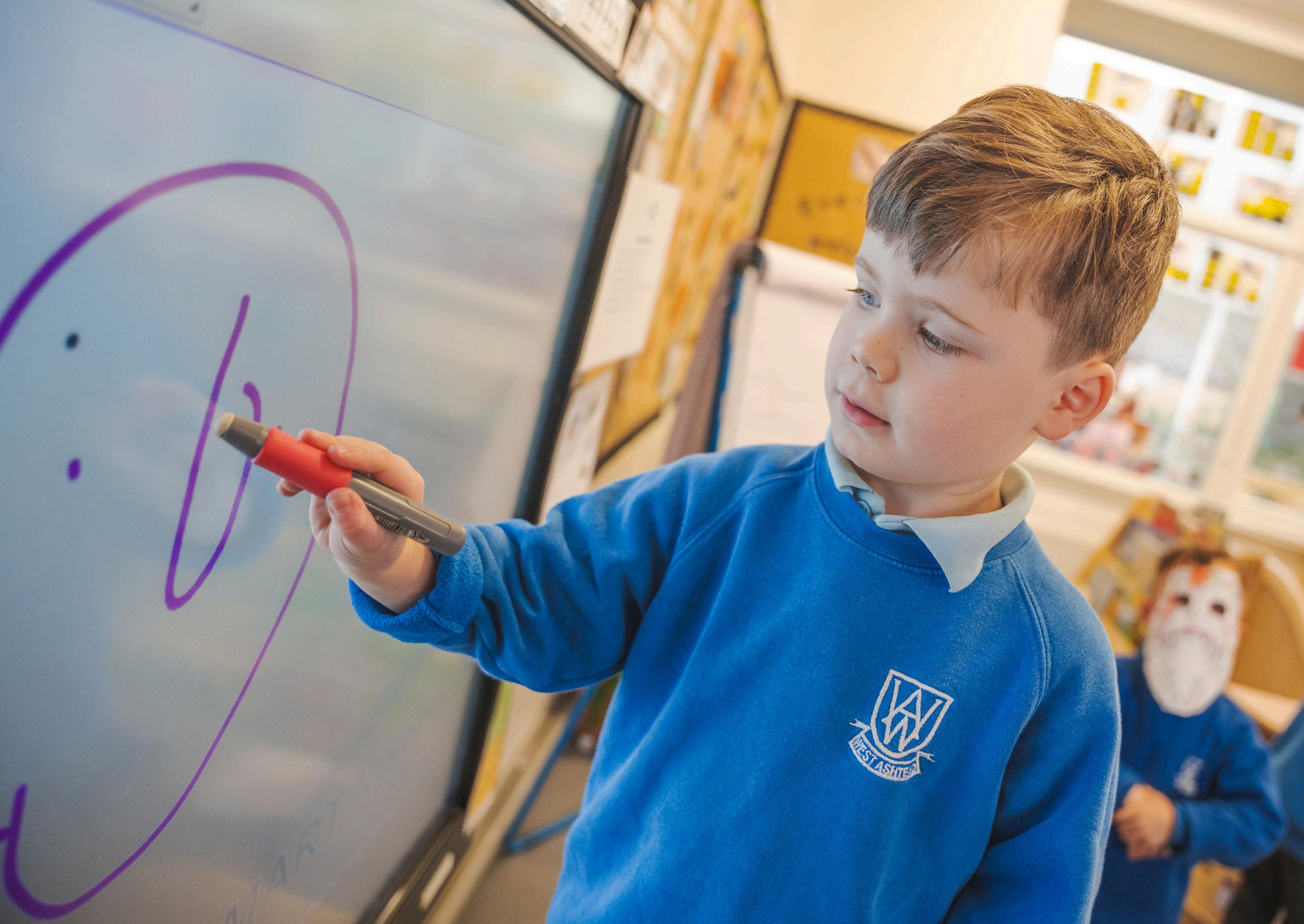

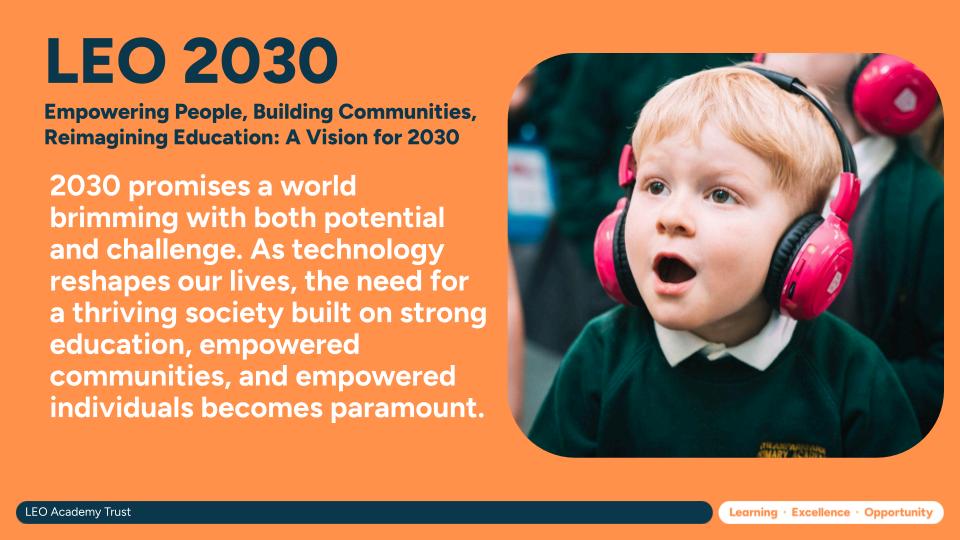
2030 promises a world brimming with both potential and challenge. As technology reshapes our lives, the need for a thriving society built on strong education, connected communities, and empowered individuals becomes paramount.
Our vision for LEO 2030 outlines a roadmap for the next six years, with a focus on three key pillars:
Empowering Education: Learning will transcend traditional boundaries, fostering critical thinking, lifelong learning skills, and global citizenship through innovative digital tools.
Inclusive Communities: Technology will bridge divides, fostering collaboration and participation across diverse backgrounds, cultures, and abilities
Thriving People: By leveraging local, national, and global knowledge, we will cultivate a future where our people are equipped to reach their full potential.
LEO 2030 is underpinned by three core principles:
Innovation: Digital technology will be harnessed creatively to unlock new learning opportunities, foster community connection, and empower individuals.
Inclusivity: No one will be left behind. Learning and participation will be accessible and relevant to all, regardless of background or ability.
Learning Beyond LEO: LEO 2030 extends beyond the walls of our Trust. It is a continuous journey, fuelled by a collaborative exchange of ideas We draw inspiration from local, national, and global practice, trends and challenges. By embracing diverse perspectives, we will cultivate a future that is not just sustainable, but empowering for all.
LEO 2030 is not a blueprint but an invitation It invites educators, community leaders, and individuals alike to join a collective effort in crafting a future where education, community, and individual potential flourish together
Personalised, lifelong, accessible and immersive.
Our LEO Explorers are communityminded citizens, connected and rea for the future.
Now - Reimagining Classrooms Pilot with Space Oasis, Whitefield Primary School, Steelcase Learning, ONVU Learning & Go for Education
Now - Reimagining Learning international to Billund, California, Helsinki and Singapo with the Turing Scheme.
By 2027 - Coming Soon!
By 2030 - Coming Soon!

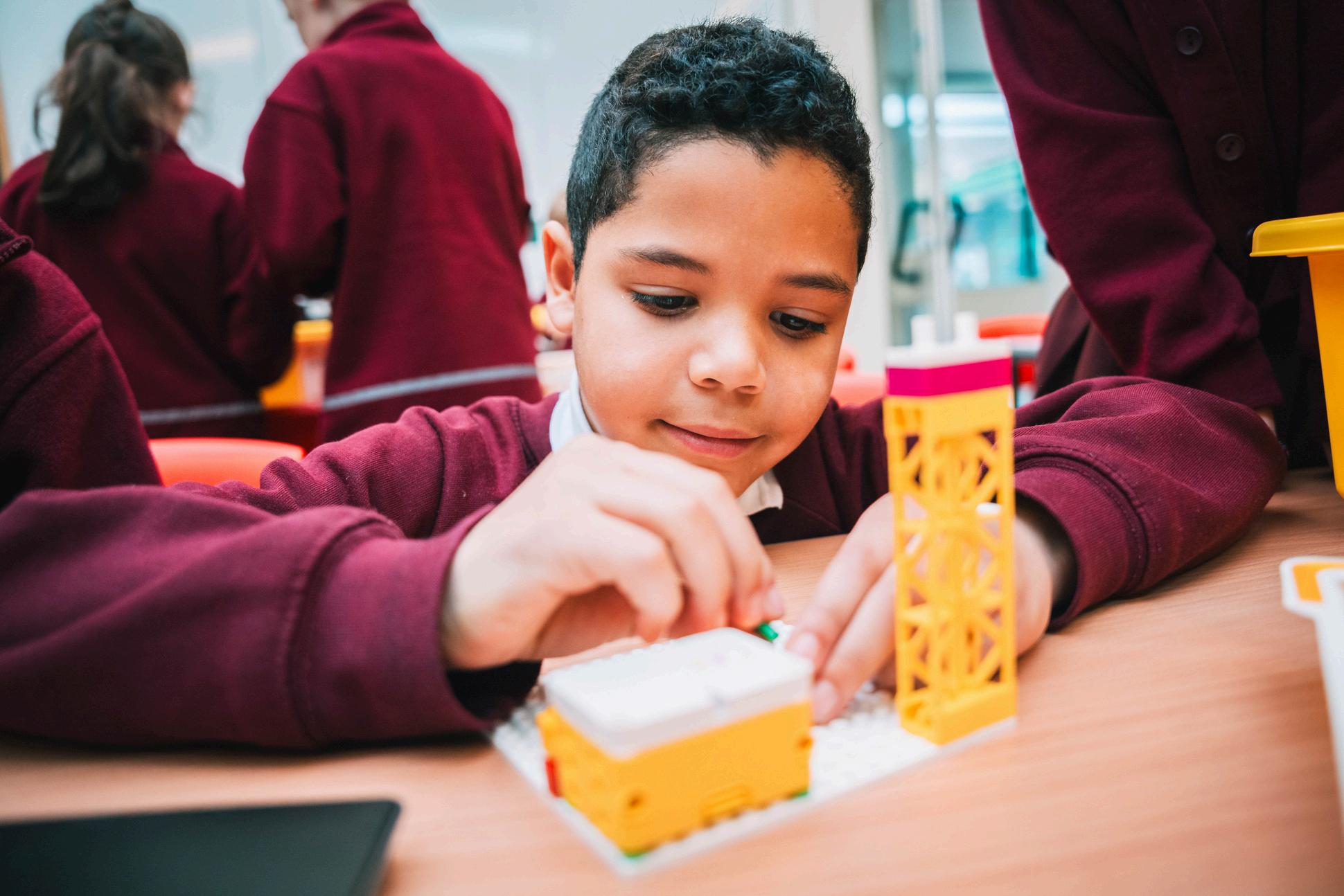
um 2030
ng all learners for a world.
owledge and adaptable ed by an innovative assessment.
Literacy & Skills Curriculum Pilot ty for All - Content Creation
Safari > LEO Expeditions > LEO
ming Soon!
LEO in the Community Thriving Together
A vibrant offer where school, community and potential connect, providing opportunities beyond the classroom.
Now - LEO Community Hub Pilot
Now - Launch LEO Foundation
By 2027 - Coming Soon!
By 2030 - Coming Soon!

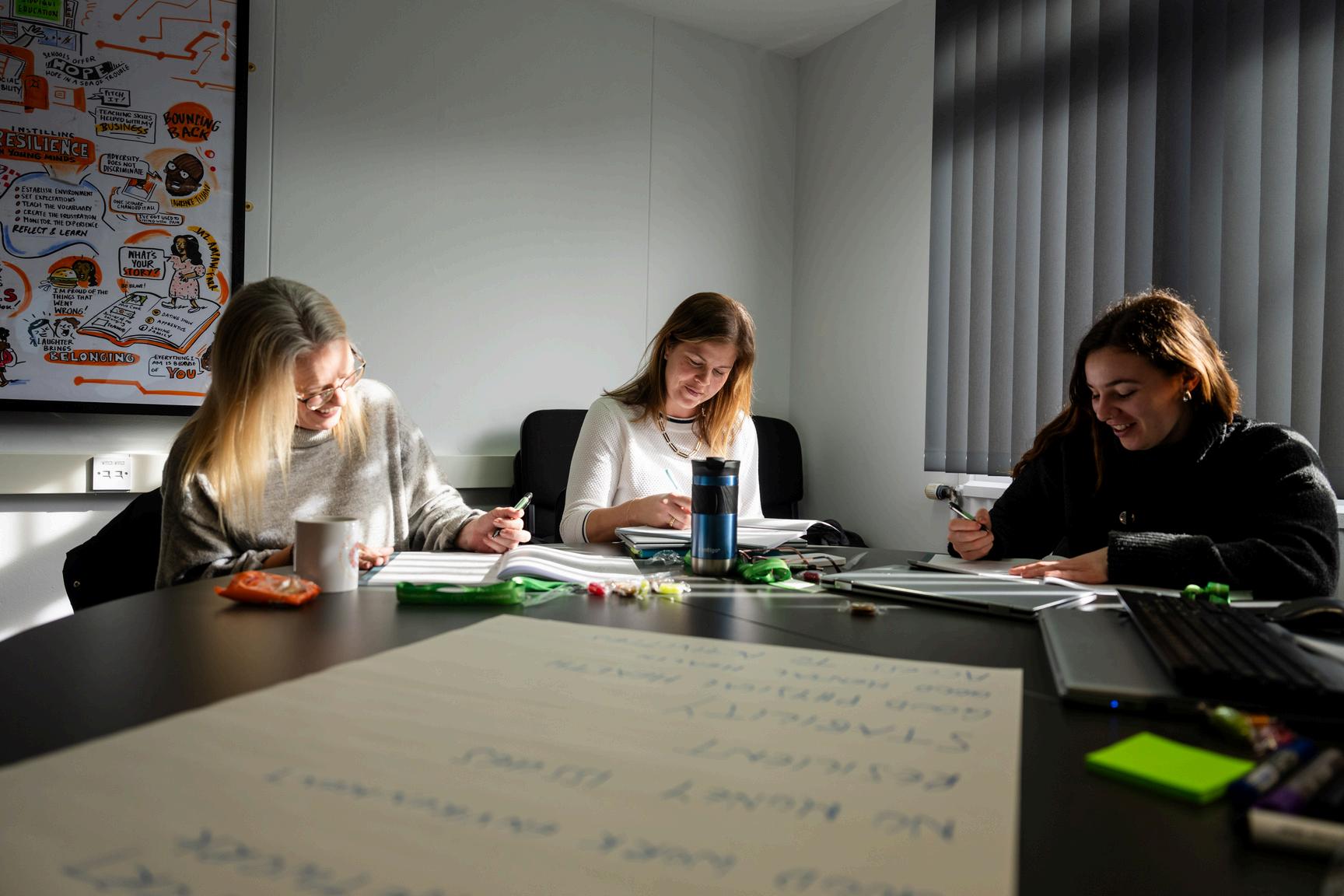
eople ited potential
ere our team is hinking and driven hrough a tive professional s an employer of tive experiences s for all.
ational Institute of ege !
Underpinned by an innovative approach to the use of digital technology and our inclusive vision of Excellence for All.


The educational landscape thrives on continuous improvement. To achieve our ambitious vision for 2030 and beyond, we will continue to embrace the power of collaborative learning. This strategy prioritises a proactive approach to knowledge exchange, looking beyond our own Trust to identify and adopt best practices at local, national, and global levels.
By fostering connections with high-performing schools and trusts, we gain valuable insights into:
Innovative teaching methodologies:
Learning from successful models will inspire and equip our educators with cutting-edge pedagogical approaches.
Effective leadership strategies:
By studying the leadership styles of high-achieving schools and school systems, we can refine our own leadership practices for maximum impact.
Examining successful student support systems implemented elsewhere will inform strategies to personalise learning and unlock every student's full potential.
This collaborative spirit extends beyond geographical boundaries. We will continue to actively seek out international best practices, exploring successful educational models from around the world. This global perspective will broaden our horizons and challenge us to think outside the box, fostering a culture of continuous improvement within our MAT.
This collaborative strategy will involve:
Benchmarking:
Identifying schools and trusts demonstrating exceptional results in areas aligned with our vision.
Establishing partnerships and fostering open communication with these institutions to learn from their successes and challenges.
Adaptation and Innovation:
Critically evaluating and adapting these best practices to our unique context, fostering an environment where we can innovate and develop our own leading practices.
This outward-looking approach will fuel continuous improvement, allowing us to:
By learning from the best, we can anticipate and navigate evolving educational landscapes, ensuring our students are equipped with the skills they need to thrive in the future.
Cross-pollination of Ideas:
Engaging with diverse perspectives fosters creativity and leads to the development of more effective strategies for student success.
Collaboration strengthens the entire educational ecosystem, benefiting not only our own schools but also the wider community.
Through proactive knowledge sharing, we can cultivate an environment where educators learn from each other, fostering innovation and accelerating progress towards our shared vision. This collaborative approach will equip our schools with the tools and strategies necessary to prepare our students for a successful future, ensuring our Trust remains at the forefront of educational excellence.





